The Senior (PG)

Starring: Michael Chiklis
September 2025
Warning! This is NOT a movie review. This is a critique of the film. Intended to initiate a dialogue, the following analysis explores various aspects of the film and may contain spoilers. For concerns over objectionable content, please first refer to one of the many parental movie guide websites. Ratings are based on a four star system. Happy reading!
When it comes to “based on a true story” movies, the premise behind The Senior has got to be one of the least likely and most outlandish in cinema history. Having never completed his senior year of college, Mike Flynt (Michael Chiklis) tries out for the football team at Sul Ross State University in Alpine, TX, and, against all odds, makes the team…at age 59!
And if that isn’t unbelievable enough, Mike, who is injured in training camp and rehabs all season, finally gets some snaps at the very end of the final game of the season—making Mike the oldest player in college football history.
Though there’s plenty of on-field action here to rivet football fans, The Senior (a clever double entendre) is much more than a sports movie; it’s a top-shelf “follow your dreams” flick with a strong moral undercurrent to please the faith and family crowd.
The emotional center of the movie is its poignant subplot involving two generations of fathers and sons. Flashback scenes of Mike’s father (James Badge Dale), teaching him how to be a man by bashing him with boxing gloves until he gets a bloody nose, are rough to watch. Other flashbacks show Mike repeating the cycle of violence with his own son, who, not surprisingly, is estranged from Mike as an adult.
The success of the movie fell largely on Chiklis’ broad shoulders (figuratively and literally: he’s built like a tank). Fortunately, the veteran TV (The Shield) and film (Fantastic Four, 2005) actor was more than up to the challenge, delivering a believable performance as a man who just wants a chance to redeem his violent past and set an example by finishing what he started decades earlier.
Some of the movie’s most meaningful moments involve Mike’s wife, Eileen (Mary Stuart Masterson). In one well-acted scene, Eileen names the conditions that must be met before she backs Mike’s rekindled desire to return to college football. Eileen’s deep concern and reluctant support of Mike’s dream help ground the film. Indeed, she gives voice to what we’re thinking—that this is a crazy idea that can’t possibly end well.
The other well-known cast member is Rob Corddry (Hot Tub Time Machine), who delivers a wonderfully restrained performance as laconic Coach Sam Weston. The “follow my lead” scene, where Coach Weston yells at the team and storms out of the locker room, is not to be missed.
Though the movie has certain similarities with Rudy (1993)—and even knowingly references the gridiron classic when Coach Weston says, “He’s like a 59-year-old Rudy”—The Senior is a unique entry into the annals of unlikely sport’s hero films.
So, is The Senior a schmaltzy biopic or inspirational true tale? You decide.
For me, this feel-good football flick (shrewdly released at the outset of football season), resembles its main character, a scrappy underdog that gets the job done.
Rating: 2½ out of 4
The Last Rodeo (PG)

Starring: Neal McDonough
May 2025
Warning! This is NOT a movie review. This is a critique of the film. Intended to initiate a dialogue, the following analysis explores various aspects of the film and may contain spoilers. For concerns over objectionable content, please first refer to one of the many parental movie guide websites. Ratings are based on a four star system. Happy reading!
Can eight seconds feel like an eternity? It can if you’re holding on for dear life as a seething bull violently jostles your body in a dozen different directions.
Three-time bull-riding champion, Joe Wainwright (Neal McDonough), blows off multiple invitations to ride in the Legends bull-riding event in Tulsa, OK. But when his grandson is diagnosed with a brain tumor, Joe chooses to put his body on the line by signing up for one last rodeo.
Brought to us by Angel Studios (Homestead), The Last Rodeo is a faith and family focused film directed by Jon Avnet (Fried Green Tomatoes). As its name suggests, Rodeo is also a sports film, with roughly a quarter of its action centering on bull-riding. The pulse-pounding cinematography is superb, riveting viewer interest with ferocious, nail-biting action sequences. These scenes provide some much-needed action to counterbalance the movie’s many somber moments.
Avnet co-wrote the script with McDonough and Derek Presley. Though heartwarming and crowd-pleasing, the film often feels like a Lifetime drama, especially during the talky character moments. Fortunately, these emotional scenes aren’t unbearably sentimental. This is largely due to the realistic, restrained performances of the stellar core cast, which is comprised of McDonough, Sarah Jones as Joe’s daughter Sally, Mykelti Williamson as Joe’s long-time friend Charlie, and Christopher McDonald as the opportunistic rodeo organizer Jimmy Mack.
The film explores several themes, including: the power of friendship, doing whatever it takes to provide for family, the reconciliation of an estranged father and daughter, an old veteran vying against a field of young upstarts (a la Cars), and a man who stopped believing in God after the death of his wife eventually finding his way back to faith (a la Signs).
In the end, Rodeo is a fairly uncomplicated, largely predictable movie with a plot built on farcical elements (Joe competing for a championship in his upper 50s) and contrivances (Charlie tells Jimmy about Joe’s ailing son and Jimmy spills the story to news agencies, which help raise awareness and financial support to help cover the boy’s exorbitant surgery).
But it’s also an inoffensive, inspiring film that should leave audiences feeling uplifted and hopeful—that despite what’s transpired in our inner cities in recent months, our society might just survive if we pull together to help the less fortunate among us.
Otherwise, this might be America’s last rodeo.
Rating: 2½ out of 4
Ford v Ferrari (PG-13)
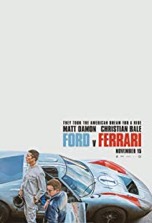
Starring: Matt Damon
November 2019
Warning! This is NOT a movie review. This is a critique of the film. Intended to initiate a dialogue, the following analysis explores various aspects of the film and may contain spoilers. Views are my own and elaborate on comments that were originally tweeted in real time from the back row of a movie theater @BackRoweReviews. For concerns over objectionable content, please first refer to one of the many parental movie guide websites. Ratings are based on a four star system. Happy reading!
Based on the actual events that took place at the 24 Hours of Le Mans race in 1966, Ford v Ferrari sets up a David v Goliath scenario where an American driving car brand (Ford) tries to dethrone the perennial champion Italian race car brand (Ferrari). To mix sports metaphors, if this sounds like the “Miracle on Ice” for the racetrack, you’re in the ballpark.
The movie opens at the 1959 Le Mans, where bleary-eyed Carroll Shelby (Matt Damon) pushes through fatigue and rainy weather to win the famed European car race. Jump forward a few years to a board room meeting at the Ford Motor Co. Henry Ford II (Tracy Letts) wants some new ideas to move the company forward. A member of the marketing team, Lee Iacocca (Jon Bernthal), comes up with a wild idea…a Ford race car.
Ford PR specialist, Leo Beebe (Josh Lucas), enlists the aid of Shelby and his team of engineers to build a prototype car for the express purpose of defeating Ferrari at Le Mans. Though designing and building the car proves to be a colossal effort (especially since they’re only given 90 days), an even greater challenge is getting everyone to agree on who should drive the car. Shelby wants his long-time friend, Ken Miles (Christian Bale), but the Ford team wants anyone but the abrasive, hotheaded speedster. The drama that ensues has just as many treacherous turns as the legendary racetrack.
What initially attracted me to this film, after seeing the trailer, was the winning combination of Matt Damon and Christian Bale. Here are two A-list actors at the top of their game in perfectly-cast roles delivering pitch-perfect performances. Acting of this caliber is a joy to behold and screen chemistry this refined is a true rarity.
Fortunately, the great performances don’t end with Damon and Bale. The movie is chock-full of terrific supporting actors like Letts (The Post), Lucas (Glory Road) and Bernthal (The Walking Dead). Other memorable performances are turned in by Caitriona Balfe (Outlander) as Miles’ wife Mollie, Noah Jupe (A Quiet Place) as Miles’ son Peter, and Ray McKinnon (Fear the Walking Dead) as Shelby’s reliable and wise assistant, Phil Remington.
Director James Mangold (Walk the Line) strikes the perfect balance between character moments and action scenes, lest one or the other should drive away with the movie. Mangold captures gritty, organic performances from his actors. One of the most remarkable bits of acting is when Ford II breaks down after Shelby takes him on a test drive in the new race car. Letts masterfully modulates (gear shifts) his emotions to the point where we’re not quite sure if he’s laughing or crying. An unforgettable scene.
Although all of the movie’s race sequences are spectacular (like the unforgettable “brake fade” scene), the start of the Le Mans race is a ferocious, frenetic experience, especially the images shot from Miles’ POV, where cars spin out of control or shatter into mounds of debris right in front of him. Thanks to Mangold (and his cinematographer, Phedon Papamichael), the race scenes aren’t overly jarring or one big motion blur as seen in many action movies today. Also effective is the way Mangold crosscuts action on the track to drama (or comedy) in the pit.
The movie perfectly captures the milieu of the 60s. From clothes, coifs and cars, to products (sodas in glass bottles) and advertisements (a giant billboard of the Coppertone girl), the attention to historical detail in the film is remarkable.
Though all the main characters are well-drawn, Miles is a particularly fascinating character study. Despite his propensity to spout off about whatever’s on his mind (his critique of the new Ford Mustang is priceless), Miles has trouble communicating with his wife. Miles initially keeps her in the dark when he’s approached by Shelby to help design the new Ford race car. Later, when Mollie drives recklessly down the road (in a humorous role reversal, the race car driver has fits of anxiety over his wife’s driving), he finally confesses that he might be in line to drive at Le Mans. Interestingly, Miles’ Le Mans experience begins and ends with the words “slow down.”
Unlike with his wife, Miles has no problem talking with his son. There are two beautiful father/son scenes in the movie. The first is when Miles takes Peter out to the racetrack at night. Miles envisioning the “perfect lap” is a magical moment. On the eve of his departure to France, Peter shows his father a hand drawn map of the Le Mans race course. In another teary moment that reveals the special bond between father and son, Miles describes to Peter how to handle each part of the track.
The political tension between the suits and the grease monkeys is a diverting story element and serves a necessary role since there isn’t an actual villain in the movie. If there’s a downside to the constant friction between the pit and the box seats, it’s that it takes our attention away from the race. As a result of the political sidebars, the movie never quite captures the war of attrition that’s waged on the racetrack as was convincingly portrayed in Steve McQueen’s Le Mans (1971).
In the final analysis, Ford v Ferrari is a high-octane biopic fueled by sure-handed directing and top-tier acting. Though not an overt “buddy movie,” Damon and Bale deliver stellar performances as loyal friends who have a need for speed.
Ford v Ferrari is a long film that never feels long thanks to its bracing drama and pulse-pounding action sequences. The movie should receive nods in many categories come awards season.
Ford v Ferrari is a fairly clean and wholesome movie. The movie’s major blemish (grease stain) is that it’s inundated with unsavory dialog, specifically expletives and crass speech. Other than that caveat, the film is recommended for history buffs, gearheads or lovers of well produced films.
The most accurate description of the film comes from one of its most amusing lines…Ford v Ferrari is “finer than frog fur.”
Rating: 3 1/2 out of 4
Overcomer (PG)
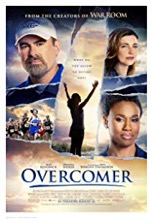
Starring: Alex Kendrick
August 2019
Warning! This is NOT a movie review. This is a critique of the film. Intended to initiate a dialogue, the following analysis explores various aspects of the film and may contain spoilers. Views are my own and elaborate on comments that were originally tweeted in real time from the back row of a movie theater @BackRoweReviews. For concerns over objectionable content, please first refer to one of the many parental movie guide websites. Ratings are based on a four star system. Happy reading!
The Kendrick Brothers (Alex and Stephen) have delivered a string of family-friendly, faith-affirming films over the years, including: Fireproof (2008), Courageous (2011) and War Room (2015). As with many of the Kendrick’s earlier movies, Overcomer uses sports as a vehicle for telling a tale of hope, faith and courage.
As the story opens, successful high school basketball coach John Harrison (Alex Kendrick) learns that the town’s manufacturing plant has closed its doors. John’s hopes of winning a state championship are dashed when many of his players are forced to move away with their families. Pressed into service as a long-distance running coach, John’s team consists of one runner, Hannah Scott (Aryn Wright-Thompson). In a cruel twist of fate, Hannah has asthma.
Through pure coincidence (or a Godincidence), John meets Thomas Hill (Cameron Arnett) when visiting someone else at a hospital. After striking up a conversation with the blind, bedridden man, John discovers that Thomas is Hannah’s long-lost father. The family drama heats up when Hannah meets Thomas for the first time and when her guardian grandmother (Denise Armstrong), who has intentionally kept Hannah from learning about her former drug addict father, finds out that Hannah’s been sneaking out to meet with Thomas.
Overcomer sets up in a similar manner to Disney’s McFarland, USA (2015), which chronicles the true story of high school track coach Jim White (Kevin Costner), who relocates to the titular town to become a cross-country coach. In this film, John doesn’t have to move, but the school’s principal (Priscilla Shirer) coaxes him into coaching a sport he knows next to nothing about. In both movies, unlikely athletes make it to the state championship, which results in a highly improbable, yet wholly satisfying story payoff.
Admittedly, the plot is oversimplified and idealistic to the extreme. Though the film has many saccharine moments, and even a few unnecessary scenes (the knee-slapping drama auditions, for instance), it has several salient themes, like: finding redemption, making amends (the movie cleverly avoids sermonizing by resolving the kleptomania subplot with a montage) and learning how to forgive.
Another theme that’s subtly woven into the fabric of the film is the discovery of identity. In a world where identity is confusing, complex and constantly in flux, Overcomer presents an extremely simple definition of identity that’s as counter-cultural as you’re likely to find. The movie’s core audience will embrace this interpretation of identity, but will it make an impact on the broader populace?
The film contains a number of nitpicks. For instance, in real life, people (especially non-relatives) wouldn’t be allowed to just stroll into a hospital (without visitor’s tags, no less) whenever they feel like it. Also, a cross-country team consists of seven runners, so Hannah wouldn’t be allowed to race by herself. Fortunately, these peccadilloes don’t significantly detract from the movie’s overall message or entertainment value.
In the final analysis, Overcomer is an inspirational story with heartfelt performances and pulse-pounding race scenes. Are you an Overcomer?
Rating: 3 out of 4
The Miracle Season (PG)
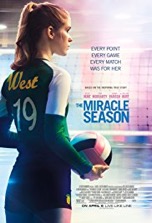
Starring: Helen Hunt
April 2018
Warning! This is NOT a movie review. This is a critique of the film. Intended to initiate a dialogue, the following analysis explores various aspects of the film and may contain spoilers. Views are my own and elaborate on comments that were originally tweeted in real time from the back row of a movie theater @BackRoweReviews. For concerns over objectionable content, please first refer to one of the many parental movie guide websites. Ratings are based on a four star system. Happy reading!
The Premise:
A high school volleyball team must overcome the loss of their team captain in order to repeat as state champions.
The Evaluation:
“Have you ever met someone who could make anything into an adventure?”
The movie’s opening line is the perfect introduction to its central character, the vivacious captain of a women’s high school volleyball team, Caroline “Line” Found (Danika Yarosh). Caroline’s ebullient personality is infectious; she makes friends with everyone she meets, even players on opposing teams. Coming off an emotional state championship win the year before, Caroline and her teammates have aspirations of repeating. After rolling past their first opponent, another championship seems all but assured. Then comes the tragic night when the news of Caroline’s fatal driving accident sweeps through the community like wildfire. The grief-stricken volleyball team’s hopeful quest for a second state championship comes to a devastating standstill. But with motivation from their inspiring coach and a resolve born out of their desire to honor their fallen friend, the players channel their anger and guilt into one all-consuming goal: “Win for Line.” Based on the true account of how the Iowa City West High School women’s volleyball team won the state championship against all odds in 2011, The Miracle Season is a strong character piece that also features some pulse-pounding action during several volleyball tournaments. Season is a deeply moving story about finding the courage to carry on after a tragic loss. Despite its similar theme to We Are Marshall (2006) and similar plot to Hoosiers (1986), Season is an inspirational sports movie where the miracle on the court pales in comparison to the one that takes place inside the hearts of the grieving players and community.
The Breakdown:
Directing- The man responsible for keeping the character moments meaningful and the volleyball game sequences taut with excitement is director Sean McNamara, who also helmed the tragedy-turned-victory sports film Soul Surfer (2011).
Acting- The cast is an eclectic mix of established and new actors. Big screen notables like Helen Hunt (who also starred in Surfer) and William Hurt are joined by some truly fine young actors like Yarosh (Heroes Reborn) and Erin Moriarty (Jessica Jones). Jason Gray-Stanford (Monk) also delivers a memorable performance as assistant coach, Scott Sanders.
Story- Ensuring that the sports elements didn’t run away with the story are screenwriters David Aaron Cohen and Elissa Matsueda. Cohen was already familiar with the genre, having co-written Friday Night Lights (2004).
Costumes/Make-up- Standard, skimpy volleyball outfits, but the rest of the movie’s wardrobe is appropriate.
Cinematography- The locations surprisingly resemble the Iowan countryside even though the movie was filmed in Vancouver, British Columbia, Canada. These locations add a great deal to the team’s road trips, especially during the snow angel scene.
Music- The evocative trumpet arrangement in Roque Banos’ score perfectly captures the film’s bittersweet aspects. The crowd singing Neil Diamond’s “Sweet Caroline” at the end of the movie is a nice touch.
Visual FX- NA
Production Values- The various production elements are respectable, especially when considering the movie’s modest budget. The school/gym interiors are authentic and the Found’s house and barn sets are functional and homey.
Movie Magic- If you enjoy high-energy sports flicks with quick cuts that amp up the action, this movie is for you. Although the story does get a tad Hallmark-y at times, it’s a clean, inspirational film that spotlights one of the more remarkable stories to have come out of the world of high school sports in recent years.
Rating: 3 out of 4 stars
Cars 3 (G)
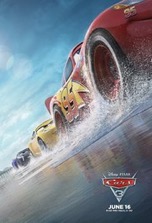
Starring: Owen Wilson
June 2017
What follows is the full-length review based on comments that were originally tweeted in Real-time from the back row of a movie theater @BackRoweReviews. Though efforts were made to tease rather than ruin this movie’s memorable lines and moments, some spoilers may exist in the following evaluation. For concerns over objectionable content, please first refer to one of the many parental movie guide websites. Ratings are based on a four star system. Happy reading!
The first Cars (2006) won over audiences with its charm, palpable nostalgia and pulse-pounding action. Cars appropriated the talking toys concept from Toy Story (1995) and built an entire world out of vehicles, including: semi trucks, helicopters, buttes that resemble vintage cars, tiny VW Bug flies and cow tractors (who could forget the “tractor tipping” scene?). The sequel, Cars 2 (2011), was an ambitious but ultimately disappointing effort that took the action overseas to Europe and featured a story that was overstuffed with the exploits of superspy Finn McMissile (Michael Caine) and an international scheme to rid the world of old or lemon cars—a subplot that was a little too on the bumper. Fortunately, the franchise is once again in pole position thanks to writer/director Brian Fee’s high octane and heartwarming story, which has returned the series to what made it such an enjoyable romp to begin with…meaningful themes couched in good old-fashioned fun. Lightning McQueen’s (Owen Wilson) career has come full circle: in the first film he was a self-centered rookie, but now the veteran racer is one loss away from forced retirement, which will doom him to pitching mud flaps for the rest of his rusty existence. When McQueen suffers a catastrophic accident, his future in the sport is placed in serious jeopardy. This tragedy recalls Doc Hudson’s (Paul Newman) similar career ending crash in the original Cars. How McQueen reacts to his situation will determine his fate: will he retire, as Doc did, or will he get back into shape and acquire the eye of the tiger? Yes, that was a Rocky reference. And yes, Cars 3 is replete with Rocky allusions, like the beach race between trainer and trainee as seen in Rocky III (1982). Also, there’s a conspicuous evocation of Rocky IV (1985) in the way upstart rookie Jackson Storm (Armie Hammer) uses the latest virtual technology to train while McQueen, under the tutelage of Doc’s former trainer Smokey (Chris Cooper), gets back to the basics by driving on dirt tracks and practicing “sneak through the window” agility tests, which require him to weave in and out of a herd of meandering cow tractors on a highway. Fortunately, this subplot is skillfully and judiciously woven into the narrative so as to avoid being a blatant rip-off of Rocky. Another carefully measured story element is McQueen’s yellow training car Cruz Ramirez (Cristela Alonzo). Even though Cruz, the only female lead (Bonnie Hunt’s Sally only appears when McQueen needs a pep talk or swift kick in the fender), isn’t introduced until about halfway through the film, she has the most compelling story arc. Insidiously, Pixar tricks us into thinking the movie’s main character is McQueen when it’s really Cruz. Did I say insidious? I meant ingenious. While most of the characters from the earlier films have bit parts here, there are a few new side characters worth mentioning, including: Nathan Fillion as duplicitous tycoon Sterling, Kerry Washington as overconfident sports commentator Natalie Certain and Lea DeLaria as terrifying, bull-like school bus Miss Fritter. Aside from all of its kid-friendly silliness, i.e., the demolition derby at the Thunder Hollow speedway, there’s also plenty here for adults, particularly for those who have entered middle age or have felt the sting of being replaced by a young, ambitious hotshot at work. On the bright side, this film is a beautiful example of how a torch passed from generation to generation (Smokey to Doc to McQueen to Cruz) can pave the way to a lasting legacy far more lustrous than a showcase full of Piston Cup trophies. It’s like the “circle of life” with cars and trucks instead of lions and warthogs. So where does the series go from here? Can one-note Mater (Larry the Cable Guy) and a doting McQueen sustain another movie? Is it time to turn things over to Cruz and a younger generation of race cars (which will inspire a whole new line of toy cars for kids to blow their allowance money on)? Regardless of whether it takes another lap or makes a permanent pit stop, the Cars series has been one wild ride.
Race (PG-13)
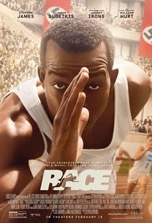
Starring: Stephan James
February 2016
The below comments (in Black) were originally tweeted in Real-time from the back row of a movie theater and appear @BackRoweReviews. Though efforts were made to tease rather than ruin this movie’s memorable lines and moments, some spoilers may exist in the following evaluation (in Red). For concerns over objectionable content, please first refer to one of the many parental movie guide websites. All ratings are based on a four star system. Happy reading!

“God spared you for a reason.” To run like the wind.
Nice to see that Jesse used the envelope system. #FiscalResponsibility
“Can you work?” Love how Jesse throws it back at him with his #CottonPicking story.
Metals not records. Important distinction.
“So long as they’re American citizens, we’ll accept Martians.” #RacialIntegration
“We’re going with the higher time.” #BS
Three #WorldRecords in 45 minutes. Unbelievable.
“You think track and field is hard, you should try marriage.” NK
Close vote, but no boycott.
Out on the track there’s “no black and white, there’s only fast and slow.” You tell him.
“Stop thinking so much, Jesse. It’s not what you’re good at.” Ha!
Luz helping Jesse out on the long jump is a nice moment.
The German crowd chanting “Owens” is a higher honor than the three gold medals.
“Don’t lose.” Don’t worry, he won’t.
The guest of honor has to go through the service entrance. Sad.
Final analysis: a comprehensive look at Owens’ plight as a black athlete during the 30s and his rise to fame.
Rating: 2 1/2 out of 4. Despite being overlong and slowly paced #Race is an inspirational biopic with an important message.
There’s a double meaning implied in the title of this latest Jesse Owens biopic, Race. The obvious reference is to the movie’s focus on Owens’ career as a track legend, culminating with his astounding performance (four gold medals) at the 1936 Summer Olympics in Berlin, Germany. The other meaning inferred by the title is Owens’ race—African American. The bitter irony here is that despite his tremendous athletic talent, Owens was treated with contempt both by Caucasian members of his own team and especially by citizens of the host nation, whose white supremacist ideals sought the eradication of Jews and blacks (ironically, two Jews were bumped from the 4 x 100 meter relay so that Owens could participate, so apparently blacks were a bit better than Jews in the twisted minds of the Aryan adherents). There was no safe haven for Owens on American or German soil, which makes his courageous story even more remarkable. Ultimately, this movie isn’t about black and white or fast and slow (as Owens avers in the film), but heroes and villains. Aside from Owens himself (Stephan James), Owens’ coach, Larry Snyder (Jason Sudeikis), is a driving force for good (and progress) in the film. Other heroes come from unexpected quarters, such as the appropriately named German long jumper Carl “Luz” Long (David Kross), who helps orient Owens to the course and German film director Leni Riefenstahl (Carice van Houten), who dared to defy Hitler by filming the 200 meter dash for posterity, an event Owens was predicted to win. The movie’s villains are the racist white Americans (like the brutish Ohio State University football players who force Owens to take a shower after them) and the many nationalized and propagandized Germans. Of course the Kaiser himself is the greatest villain here—besides initially banning Jews and Blacks from the Games, which nearly sparked an international boycott, Hitler refused to shake Owens’ hand in clear defiance of Olympic tradition for gold medal winners. Granted, there are a few gray characters in the film as well, such as the duplicitous Avery Brundage (Jeremy Irons) and prejudiced Olympic team coaches like Lawson Robertson (Defiance’s Tony Curran). Race has greater scope than earlier films based on Owens’ life and has the added benefit of CGI as a storytelling tool. These computer effects are most noticeable in the sweeping crowd scenes when Owens first enters the Olympic stadium in Berlin. But is the movie better off for all of its technological advances and advantages? Opinions will vary, but I think CGI was judiciously employed in the film. The effectiveness of the movie’s broad stroke approach to telling Owens’ story is also a matter of debate. Some will appreciate the movie’s in-depth history lesson and the many ancillary story lines (Riefenstahl) that are woven into the movie’s narrative tapestry. Others (like moi) will maintain that the film takes us away from the focal point (Owens) too frequently and tries to achieve too much in the social and political arenas instead of adhering to its core identity as a historical sports movie…unlike the exploits of its main character, the story isn’t very streamlined. How ironic that a movie about sprinting should be paced like a long distance run and have the running time of an average half marathon. Race is an educational and inspirational film that ultimately fails to move its audience. Sad to say, but despite its efforts to decry the injustices of prejudging a person based on their appearance, Race is skin-deep.
Concussion (PG-13)
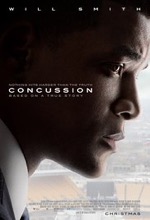
Starring: Will Smith
December 2015
The below comments (in Black) were originally tweeted in Real-time from the back row of a movie theater and appear @BackRoweReviews. Though efforts were made to tease rather than ruin this movie’s memorable lines and moments, some spoilers may exist in the following evaluation (in Red). For concerns over objectionable content, please first refer to one of the many parental movie guide websites. All ratings are based on a four star system. Happy reading!

“Banging heads...it’s not a natural thing.” Sounds like the movie’s central thesis.
“The science of death.” Macabre study. Takes a special person.
“Talk to them in your head.” Ha! #CadaverWhisperer
“Those are my peaches. They should not be there.” LOL!
“I’m dying in here!” Some amazing acting by #DavidMorse.
“One should eat breakfast in this country.” Got him!
“People do not go mad for no reason.” This one did. #MikeWebster
The jar illustration is downright frightening.
“God did not intend for humans to play football.” Scientifically accurate, but not a popular view among fans.
“Uneducated quack.” Idiot!
“The NFL owns a day of the week.” And Monday and Thursday nights too. #NFL
“This does not show up on a CT scan.” Get a #SPECT. #CTE
“They have to listen to us now.” #BurdenProof
“Tell the truth.” #Goosebumps
“If you don’t speak for the dead, who will?” #SpeakerForTheDead
“Please ask him to help me.” Touching scene. #HonestPrayer
Bennett finally gets to speak about concussions.
America’s forensic pathologist. #HighHonor
Final analysis: a sobering look at the dark reality of America’s favorite pastime.
Rating: 3 out of 4 stars. A transformative performance by #WillSmith in a David vs Goliath tale of courage.
During a conversation focused on the growing problem of head injuries in sports, Alec Baldwin (as Dr. Julian Bailes, former team doctor for the Pittsburg Steelers) makes this statement about American football: “It is a mindless, violent game, and then it’s Shakespeare.” This ironic dichotomy not only serves as the film’s underlying premise, it also effectively expresses the ambivalence felt by many players and fans who must grapple with the bitter reality that the fun and exhilaration they derive from the popular pastime comes with a price. By dint of its classification as a contact sport, you can’t have a high level of excitement without punishing tackles and vicious blows to the head. And yet, most people, especially with what we now know about the sport’s potentially devastating effect on the brain, would agree that we must do more to protect football players from TBIs (traumatic brain injury) or, as Dr. Bennet Omalu (Will Smith) discovers in the film, CTEs (chronic traumatic encephalopathy). Omalu first encounters the disease while conducting extensive tests on the brain of legendary Steelers center Mike Webster (David Morse). As Omalu continues conducting autopsies on deceased football players, he detects a pattern which becomes the basis for his landmark journal article, which leads to an official diagnosis (CTE), which generates skepticism from many in the medical community and outright hostility from the NFL…after all, it owns a day of the week. As ironic as it seems, discovering the degenerative condition inside players’ brains turns out to be a far easier task for Omalu than convincing the NFL of his findings. What kicks off as a standard sports movie morphs into a medical procedural and ultimately ends up as a David vs. Goliath political thriller. Above all, Concussion chronicles one man’s dogged pursuit of the truth and the considerable diametrical forces that attempt to discredit and squelch his work (this struggle of opposing views is not too dissimilar from the basic arrangement of players on the football field: offense and defense). Smith turns in a remarkable performance as Nigerian pathologist Omalu and absolutely nails the accent. The supporting players are also extremely effective in their roles, especially Morse, whose portrayal of the deteriorating NFL star is heartbreaking and haunting. Honorable mention goes to: Baldwin, Albert Brooks (as Omalu’s supervisor), Gugu Mbatha-Raw (as Omalu’s wife) and Luke Wilson (as NFL commissioner, Roger Goodell). One wonders how much interference director Peter Landesman encountered while spearheading this even-handed effort to expose the ugly truth of the NFL (in specific and football in general). With the considerable connections and bankroll the league has at its disposal, it’s a minor miracle that a movie like Concussion ever made it to the big screen. And the fact that the film was released on Christmas Day, deep into the NFL’s regular season, shows that Columbia Pictures isn’t the least bit intimidated by the institution it’s brazenly indicting. I admire that kind of pluck, and, judging by his onscreen characterization, something tells me Omalu would too.
Creed (PG-13)
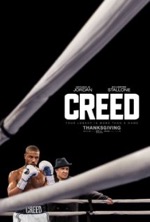
Starring: Michael B. Jordan
November 2015
This review was originally tweeted in Real-time from the back row of a movie theater and appears @BackRoweReviews. Though efforts were made to tease rather than ruin this movie’s memorable lines and moments, some spoilers may exist in the following evaluation. The original tweets appear in black, while follow-up comments appear in red. For concerns over objectionable content, please first refer to one of the many parental movie guide websites. All ratings are based on a four star system. Happy reading!

No. But it is your uncle’s Rocky movie.
Adonis, son of Apollo, fights all the time. #FamilyBusiness
Adonis’ son will be named Agamemnon.
#CreedMansion Movin on up!
This cements the movie’s rags to riches theme.
Fighting without head gear. Duuumb!
Fighting in general…duuuumb. Or at lest tha the wey it meks ya.
“Time takes everybody out...it’s undefeated.” #Rocky
The first great line in the movie and a glimpse of the quality writing to come.
A “self taught” boxer. Good luck with that.
I once read a book about how to become an astronaut. Does that qualify me to go into space?
“What cloud?” Hilarious!
Generation gap.
Old school training. #SlowChickens
A really funny scene that hearkens back to Rocky’s training in Rocky II (1979).
The #ToughestOpponent scene is a nice moment. #ManInTheMirror
This scene underscores the commonly held view that a big part of boxing is psychological.
“Without the name there’s no fight.”
A line that exposes the dark underbelly of boxing…that it’s all about the money.
Adonis is afraid of being the “Fake Creed.”
His opponent, Conlan (Tony Bellew), later calls him a “False Creed.” This strikes at the heart of Adonis’ identity crisis.
Don’t call him “Baby Creed.”
It doesn’t take much to push an angry person over the edge.
“If I fight, you fight.” Yeah!
The line was telegraphed by earlier statements, but it still works.
Creed trunks. Special moment.
The best of both names. A key moment in Adonis accepting who he is and finding his true identity. And not a moment too soon.
“Can he fight?” #LetsGetReadyToRumble
Nice to see legendary ring announcer, Michael Buffer, in the movie. Adds a nice note of authenticity.
“Proud to be a Creed.”
He’s proud to be an American too…just take a look at those trunks.
Final analysis: a meaningful sequel that moves the franchise forward in a bold new direction.
You’ve got to tip your hat to Stallone, who keeps finding new ways to move his franchise forward.
Rating: 3 out of 4 stars. Superb performances by Jordan and Stallone. The best #Rocky movie that isn’t.
The seventh film in the franchise is actually the first with Creed in the title. As you’ll recall from the first four Rocky films, Apollo Creed (Carl Weathers) was Rocky’s nemesis turned friend, who met an untimely end in Rocky IV (1985). In the early goings of this film, we learn that Apollo had an illegitimate son named Adonis. Adonis is filled with anger over being raised in a foster home, and over never having met his father, and learns how to brawl at a young age. The adult Adonis (Michael B. Jordan) channels his aggression into boxing, which leads him to discover the identity of his deceased progenitor, which eventually leads him to Rocky (Sylvester Stallone). Initially reticent to get involved, Rocky finally agrees to become Adonis’ trainer, and you can guess where the film goes from here…for the most part. As an origins tale for Adonis, the movie’s rags to riches theme is in full force along with the master/pupil story element that worked so well in the first two Rocky movies with Burgess Meredith’s Mighty Mick. While Jordan’s characterization of Adonis isn’t overly complex, the physically demanding portrayal of Adonis, like Stallone’s punishing performances in his Rocky movies, is to be commended. The movie is all about self-discovery, the courage to keep fighting no matter what, the necessity of having family in your life (whether biological or not) and to always wear head gear when sparring (okay, so that’s not really one of the movie’s themes, but it is an important safety tip). Other than Adonis’ mother’s (Phylicia Rashad) mansion and his boxing trunks, there really isn’t anything glamorous about the film, which is actually a boon. The gritty look and feel of the film, and its inner city locations, resembles the original rather than the many sequels. Despite its fine production, clever premise and raw performances, the story line is fairly uncomplicated and is riddled with boxing movie tropes, i.e., the main character’s rough upbringing, an older/wiser mentor, training sequences/montages, key fight as the climactic event, etc. The twist on the formula is that Adonis is struggling to find his identity in the shadow of his father’s brilliant career. There are some really good character moments in the film, like Rocky’s “toughest opponent” training exercise and the “If I fight, you fight” scene where pupil challenges teacher. The motivational sayings are laid on pretty thick in the movie, which will be inspiring for some and annoying to others. Other than its sound bite dialog, predictable plot, stiff acting by Stallone (which actually fits his character this time around) and oversimplified story, there’s little else to critique here. The movie represents a changing of the guard: Rocky (finally) hangs up his boxing gloves and takes a young fighter under his wing. This symbolic transference of the mantle is nowhere more powerful and painful than in the final sequence, where Rocky struggles to climb the steps that he triumphantly vaulted in the first Rocky film. It’s a bittersweet and uber-nostalgic moment that’s also an extremely effective means of showing Rocky’s entire arc from young fighter to old trainer. The scene is ineffably poignant. So, with the baton securely passed from Rocky to Adonis, will there be a Creed 2? And if so, will Stallone be in it? Something tells me Stallone will appear in these films as long as he’s physically able to amble onto a movie set. Even if you aren’t a fan of his acting, you can’t take away the fact that Stallone is absolutely brilliant at finding new ways to keep his franchise pounding away at that side of beef.
Southpaw (R)

Starring: Jake Gyllenhaal
July 2015
This review was originally tweeted in Real-time from the back row of a movie theater and appears @BackRoweReviews. Though efforts were made to tease rather than ruin this movie’s memorable lines and moments, some spoilers may exist in the following evaluation. The original tweets appear in black, while follow-up comments appear in red. For concerns over objectionable content, please first refer to one of the many parental movie guide websites. All ratings are based on a four star system. Happy reading!

With much respect to ring announcer Michael Buffer for his signature line.
The ritual of padding the boxer’s fists is extremely involved. Takes up a couple minutes of screen time.
Besides serving as an intro over the opening credits, this sequence demonstrates just how painstaking the preparations are for a bout and how boxing is, indeed, big business.
“Is that all you got?” Don’t taunt the guy.
Especially when you have blood streaming down your face.
“You got hit a lot, dad.” Hope’s daughter counts the boo boos on his face.
This is a really cute scene and a practical way for Hope’s daughter to gage how rough her daddy’s night was in the ring.
“You wanna go two rounds with me, champ?” Sign me up!
For Rachel McAdams I’m sure I could somehow find the strength.
“It’s not that bad.” Famous last words.
Hope head butts the referee. Where was that fight earlier in the bout?
Misplaced anger seems to be an issue for many boxers.
“Let me just give my daughter a hug.” Heartbreaking.
And when the bailiffs try to subdue Hope, you just know that things aren’t going to end well.
No wife, no house, no kid. Things have really gone south for Southpaw.
Somebody needs to play this Country song backwards so that Hope can get back everything he’s lost.
“Can’t even hit a question.” Ha!
“Stopping punches with your face is not defense.” That’s okay, Hope, Rocky was never any good at defense either.
Though not nearly as legendary as the training scenes in the Rocky films, the techniques Forrest Whitaker’s Tick Wills uses are also memorable and highly effective. I love the “strings in the ring” scene.
“Make him miss, make him pay.” Good strategy.
Fighting smarter, not harder, is the order of the day…a radical departure from Hope’s earlier, “human punching bag” style of boxing.
“Don’t let this man control you.” This is intense.
You just don’t go insulting a man’s family like that. I don’t know what the punk was thinking, but whatever it was, it backfired…in a big way.
Grab a tissue box for the final father/daughter hug.
Finally a glimmer of hope in this Murphy’s Law on steroids story.
Final analysis: a hard hitting redemption drama with a tremendous performance by Gyllenhaal.
However, as good as this performance is, it doesn’t top what Gyllenhaal achieved as the mentally deranged news cameraman in last year’s Nightcrawler.
Rating: 3 out of 4 stars. An often bleak look at a fallen star that thankfully offers some hope at the end.
For those not in the know regarding boxing jargon, southpaw refers to a left-handed fighter. Another aspect of the word comes to light during this film’s climactic fight when Billy Hope (Jake Gyllenhaal) switches from a right-handed to left-handed attack. It’s the reverse of Inigo Montoya’s surprise revelation in The Princess Bride (1987), “I am not left-handed.” When analyzing any boxing film, natural comparisons must be made to Rocky (1976) or even earlier films like The Set-Up (1949) or Somebody Up There Likes Me (1956), both directed by Robert Wise. In these examples, and many others, something resembling a pattern has emerged and a few of those boxing film tropes include: enacted boxing sequences (of course), a middle to lower class meathead who has lots of pent up anger from a childhood trauma or other family drama, a miraculous comeback against all odds and crowd-pleasing training scenes that help the audience to identify with and cheer on the main character. Many of those ingredients are present in this pugilistic portrait as well, with one notable exception; Hope is already at the pinnacle of his profession when the movie begins. Whereas Rocky was a populist rags to riches tale, Southpaw is a reversal of fortunes faux biopic that’s just as brutal outside the ring as inside it. The movie presents a fascinating character study of a man who parlays his talents into a career that provides everything he’s ever wanted in life—the World Light Heavyweight title, a gigantic estate, a fancy sports car, a beautiful wife and a cherubic daughter. However, Hope’s performance-driven existence implodes like a house of cards when tragedy befalls his family and he’s forced to be a father for the first time and get a job outside of boxing, which is all he’s ever known. Gyllenhaal is terrific as the movie’s central, tragic figure and is thoroughly convincing as both cocky champ and down-on-his-luck chump. This part splits its screen time between the public and private lives of the boxer, and Gyllenhaal plays each of these character aspects to perfection. This physically punishing role surely took its toll on the actor, so kudos to Gyllenhaal who, literally, suffers for his art in this film. Aside from the lead performer, the supporting players are also exceptionally good here, especially Rachel McAdams as Hope’s wife and Forest Whitaker as Hope’s no BS trainer. If the movie has a drawback, it’s the merciless and unrelenting Murphy’s Law plot, which turns the film into an exercise in bleakness and futility. By way of warning, the sustained heavy-hitting drama and frequently violent fight scenes may be too intense for some viewers. As such, Southpaw is about as enjoyable as hitting your thumb with a hammer. Fortunately it isn’t as painful and is more worthwhile in the end. Though the final scene offers an avenue of redemption for the downtrodden fighter, don’t expect a triumphant celebration like the ones found in the Rocky films. A solitary ray of hope is about all this film can muster.
Final Note: This film features James Horner’s final, posthumous score. Horner was one of the great film composers of our time. May he RIP.
McFarland, USA (PG)
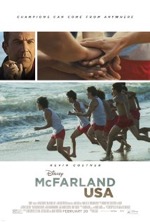
Starring: Kevin Costner
February 2014
This review was originally tweeted in Real-time from the back row of a movie theater and appears @BackRoweReviews. Though efforts were made to tease rather than ruin this movie’s memorable lines and moments, some spoilers may exist in the following evaluation. The original tweets appear in black, while follow-up comments appear in red. For concerns over objectionable content, please first refer to one of the many parental movie guide websites. All ratings are based on a four star system. Happy reading!

From Disney studios? You betcha’!
Costner as a high school football coach. It fits, but I thought this was a cross country movie.
Beware the job ending ricochet.
“Are we in Mexico?” Must’ve taken a wrong turn at Albuquerque.
If you’re not familiar with this reference, you need more Looney Tunes in your life.
Welcome to McFarland. Have a chicken.
The new family pet.
Invisible, expendable kids. Sad.
This is a disheartening indictment on the state of our education system.
“Congratulations, you just made the cross country team.” Ha!
No tryouts necessary. Now go run ten miles.
First meet. Palo Alto. No respect for team “Taco Bell.”
Racism in any form is ugly, but when it’s employed in a taunt it’s like squirting lighter fluid on an open flame. Of course, the team uses the anger from those taunts to fuel their revenge tour all the way to the state finals.
Makeshift course for hill conditioning. “The higher the better.”
The almond mounds serve a double purpose: hills to train on and physical reminders of how it took many hours of hard work from an army of low wage pickers to build them.
Costner must overcome the team’s “picker” mentality.
A rigid pattern of thought that leads to the conviction that things will never change for the better.
The bridge scene is moving.
Costner rides a pink “Barbie” bike. He rode a purple girl’s bike in #ThreeDaysToKill.
“Good race amigo.” Ha!
Paybacks are sweet.
Costner learns how to cut cabbages. Earns respect and the title “coach.”
Note to self: If ever you complain about your job at any point in the future re-watch this scene for a reality check and be grateful for what you have.
“Who’s tougher?” Good pep talk.
“McFarland’s going to state.”
A bit of a spoiler, but you could probably guess this from watching the trailer. Anything less would make this a fairly unremarkable story, yes?
“We’re not the chiefs, we’re the indians.” Sage advice.
A lesson that’s better to learn as a young man than an old one.
Costner’s “superhuman” speech is truly inspiring.
Danny Diaz saves the day. What a moment!
One of the ultimate examples of teamwork I’ve ever seen in film. Goose bump inducing.
Final analysis: an inspirational true story sports movie that hits all of the right emotional notes.
In the theater I attended, the entire audience began applauding when the end credits started to roll. Proof positive.
Rating: 3 out of 4 stars. A heartwarming and crowd-pleasing film with another tailor made role for Costner.
As sports go, cross country running isn’t one of the more exciting ones to watch. It also isn’t one of the more exciting sports to base a movie on. However, this film is surprisingly watchable thanks, in large part, to its star. Kevin Costner, the undisputed king of sports movies, plays Jim White, a failed football coach who gets a crazy idea to start a cross country program in the small farming community of McFarland, CA. Costner slips into this role as easily as when he puts on his favorite pair of boots: his rugged, Everyman appeal is a huge boon to his portrayal of Coach White. Not only does Costner look the part, but the veracity he brings to the role makes it seem like he really is a high school coach. In fact, Costner’s performance is so convincing and so effortless that the line between performer and character is exceptionally blurred at times: Costner the actor is subsumed into Costner the coach. As easy as it would be to give the lion’s share of the credit to Costner and his screen wife, Maria Bello, it’s really the no-name cast of Hispanic actors who are the heart and soul of the film. What shines through the most in this story is the hardworking and family focused citizens of Small Town, USA. The movie effectively explores how the other, other half lives and serves as a poignant reminder of the humble beginnings many people come from…and the scores more who never get the chance to improve their circumstances in life. The movie is educational; both in how it raises awareness of the lesser-known sport of cross country and in the way it reveals the inner workings of the Latino culture. The movie is also inspirational, depicting the means by which perseverance and teamwork can pave the pathway to success. Though the sports elements, and even the exultation and satisfaction over seeing the team win big, lend the true story its feel-good exuberance, the film attempts to impart something much deeper than just a standard chronicling of yet another high school championship team. The movie takes us back to the basics—dedication, loyalty and community, to name a few. In the final analysis, the biopic aspect is far less compelling than the movie’s subtle reminder of what really matters most in life: keeping the main thing the main thing. It’s a universal challenge that applies to those living in a sprawling metropolis or in McFarland, USA.
Unbroken (PG-13)

Starring: Jack O’Connell
December 2014
This review was originally tweeted in Real-time from the back row of a movie theater and appears @BackRoweReviews. Though efforts were made to tease rather than ruin this movie’s memorable lines and moments, some spoilers may exist in the following evaluation. The original tweets appear in black, while follow-up comments appear in red. For concerns over objectionable content, please first refer to one of the many parental movie guide websites. All ratings are based on a four star system. Happy reading!

And co-written by the Coen brothers, based on Laura Hillenbrand’s bestselling biography. You’d be hard pressed to find a stranger amalgamation of creative talent on any movie project, much less a historical biopic.
Heavy flack...so much for the sneak attack.
Correction: flak. Flack is what I’ll get for misspelling the word.
“Love thine enemy.” An apropos homily for what’s to come.
Run, Louie, run!
With apologies to Forrest. But seriously, this scene reminded me a lot of the early running scenes in Forrest Gump (1994).
Brother’s parting words are profound.
In fact, Louie’s brother has some of the most inspirational lines in the film and is, arguably, the reason why Louie has the mental tenacity to survive his many ordeals.
Certified by Helen Keller. Ha!
Helen Keller jokes are usually made in poor taste, but I couldn’t keep from laughing at this one given the context.
A bump on the raft in the middle of the night. Doesn’t get much more terrifying than that.
I’m pretty sure I wouldn’t get a wink of sleep…in fact, I’m positive.
The barf scene is disgusting. Glad I didn’t see this in 3D.
Lest you grow frustrated searching Fandango for a 3D version of the film, know that I was using hyperbole here. My comment was solely intended as a jest. Still, Jolie didn’t have to film the puke coming straight at the camera…and audience by extension.
Take your pick: a strafing plane or man eating sharks.
Would you rather die on the open seas or be taken to a Japanese internment camp?
There’s a card game with similar hypothetical quandaries, but I’d be willing to bet that this scenario isn’t one of them.
Louis refuses to read a false statement...becomes a human punching bag.
The price of allegiance…and integrity.
The Tokyo Ritz turns out to be a coal barge.
Instead of a chocolate on their pillow they get a lump of coal as their pillow.
Louis lifts a heavy beam over his head...his own personal cross.
In addition to being beaten with a bamboo stick and repeatedly punched in the face, this is yet another parallel between Louis’ sufferings and Christ’s.
Final analysis: a heavy true story that captures the triumph of the human spirit amid tragedy and suffering.
Rating: 3 out of 4 stars. Not an enjoyable film but an important and inspiring one.
I must admit, when I first learned that this film was directed by Angelina Jolie and co-written by the Coen brothers, I had serious doubts that it would adhere to Laura Hillenbrand’s bestselling book or, more importantly, honor the extraordinary life of its central personage, Louis Zamperini. I’ve never been happier to have been proven wrong. Jolie’s direction isn’t masterful but it’s very good…perhaps even surprisingly good. Of course, Jolie was supported by some exceptional talent behind the camera, beautiful location work and finely crafted, period appropriate props, sets, costumes and other production elements. The story hews fairly close to Hillenbrand’s novelized biography with a few notable embellishments and exclusions. While the book mentions the survivors catching birds and fish for food, grabbing a shark right out of the water by its tail seems a bit Hollywoodized. One significant omission from the film is that during the Summer Olympic Games in Berlin (1936), Zamperini actually met Hitler, who complimented the runner on his record-shattering final lap of the 5000-meter race. While on the subject of the Olympics, I wish Jolie would’ve spent more time on this aspect of Zamperini’s amazing life journey…it would’ve served as a lighter, happier counterbalance to the bleak and tragic events that dominate the back half of the film. To whit, for those who are disturbed by images of violence, the movie’s torture scenes may be difficult to endure. Though a far cry from torture porn, squeamish spectators are advised to avert their eyes or make a run to the concession counter during the beating scenes. All things considered, Jolie acquitted herself well in her second directorial effort and the story itself, though difficult to watch at times, is undeniably inspirational. It fills me with profound sadness that Zamperini never got to see his life story on the big screen—he passed away on July 2, 2014. This was a true account that deserved to be experienced by a mass audience, so I’m thrilled that it’ll now be immortalized on the big screen for future generations to experience. Your life and legacy are an inspiration to us all, Louie. RIP.
When the Game Stands Tall (PG)
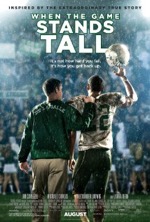
Starring: Jim Caviezel
August 2014
This review was originally tweeted in Real-time from the back row of a movie theater and appears @BackRoweReviews. Though efforts were made to tease rather than ruin this movie’s memorable lines and moments, some spoilers may exist in the following evaluation. The original tweets appear in black, while follow-up comments appear in red. For concerns over objectionable content, please first refer to one of the many parental movie guide websites. All ratings are based on a four star system. Happy reading!

Nice archival footage of the real team.
Always a plus in these true story sports films.
“A perfect effort from snap to whistle.” I’m inspired.
However, Caviezel’s non-modulating droning isn’t a good match for an inspiring high school coach. Perhaps he’s been playing the soft-spoken John Reese on Person of Interest for too long, but he needed to get more fired up for this role.
Coach throws an opportunity in the trash.
Most people in his position would die for such an opportunity.
Coach survives the widow-maker.
And we’re not talking about a sandwich or burger with that moniker. Nor a movie with Harrison Ford as a submarine commander.
“Lame dad.” Ouch!
He was only trying to help his friend. What a senseless tragedy.
“They’re playing just like us.” Uh-oh!
Whenever you come to such a realization, it’s already too late.
Field trip. Some much needed perspective.
Coach Boone (Denzel Washington) took his team on a field trip to Gettysburg in Remember the Titans (2000). The location here is quite a bit different, but the result is similar in that players are forced to look beyond their own struggles and, in this case, see the problems and needs of others.
“Well it sure aint Gatorade.” Ha!
Correction: ain’t has an apostrophe. However, since ain’t ain’t a word and because ain’t ain’t in the dictionary, does misspelling it really matter?
Team sharing session...a nice moment. See, guys can emote.
I’m just glad they didn’t have a group hug.
The first nationally broadcasted high school game on TV is a special one.
An epic confrontation and just what the team needed to get back on track.
Take a knee and raise your hat for a heartwarming finale.
However, part of me sympathizes with the over-competitive dad (Clancy Brown), who wants his son to break the record. You only get one chance in life to achieve something like that. You can always raise a hat after the record’s been secured, right? I know, I know, we wouldn’t have the mushy ending that way.
Final analysis: an inspiring true story about overcoming adversity with courage and integrity.
Rating: 3 out of 4 stars. A meaningful story with solid performances. A lot of bang for the budget.
Or is it “boom,” as #JohnMadden, who appears in the closing credits, would say?
Based on the incredible real life story of one high school football team’s (the De La Salle Spartans) legendary run of 151 consecutive victories (the longest winning streak of any team in sports history), this film follows in the footsteps of the great gridiron tales of yesteryear. By now, these factual football movies have developed a well-established (well-worn?) formula: archival footage of the original team, reenactments of key games, tragedy befalling one or more of the characters, a caring/inspiring coach, a noteworthy achievement garnering national headlines, etc. Although this film doesn’t have the same financing, production values or cinematic polish as major studio releases like Remember the Titans (2000), Friday Night Lights (2004) or We Are Marshall (2006), the story is worthy of its big screen showcase and the talent on tap (Caviezel, Michael Chiklis and Laura Dern) helps to elevate the material while shrewdly disguising its budgetary limitations. Caviezel is serviceable as Coach Ladouceur, but his monotone delivery belies the passion he seeks to instill in his players…Caviezel only raises his voice during one locker room speech. I have no way of knowing if the actor’s quiet intensity mimics the real coach’s vocal inflections or not (I’ve never met the man), but on the face of it Caviezel doesn’t seem like a natural fit for the part of a spirited football coach. Chiklis provides some comic relief and sage advice as Ladouceur’s assistant coach and, in light of Caviezel’s understated, emotionally vacant performance, is the heart of the film. Dern, as Ladouceur’s supportive wife, makes the most of a limited role, but her talents are wasted on a part that’s completely servile to the exigencies of her husband’s career. The one story line possessing the potential for character complexity is the father-living-through-his-son scenes between uber-controling dad (Clancy Brown) and his star running back son (Alexander Ludwig). Unfortunately, due to standard dialog and minimal screen time, this subplot ends up being the narrative equivalent of an incomplete pass. There are certainly finer examples of its kind in the annals of true story football accounts, but this movie has found its own niche and the fact that it’s also inspirational and family friendly is so much the better.
Million Dollar Arm (PG)
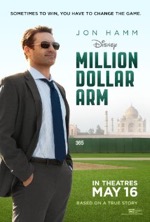
Starring: Jon Hamm
May 2014
This review was originally tweeted in Real-time from the back row of a movie theater and appears @BackRoweReviews. Though efforts were made to tease rather than ruin this movie’s memorable lines and moments, some spoilers may exist in the following evaluation. The original tweets appear in black, while follow-up comments appear in red. For concerns over objectionable content, please first refer to one of the many parental movie guide websites. All ratings are based on a four star system. Happy reading!

Million Dollar Baby was already taken, so Disney settled on Arm. Don’t believe a word I say.
“A highly improbable challenge” to turn a cricket bowler into a baseball pitcher.
With unlimited time and money, this feat might be attainable. But training two Indian teens (who have never even touched a baseball before) to become pitchers on a professional baseball team within one year would be a ludicrous proposition, right? Keep watching.
“Indians love honking and bypassing the system.”
This makes for a funny scene, but I wonder how many Indians would feel mischaracterized by this statement. The two Indian lads (neither of whom like cricket, which exposes another stereotype imposed upon Indians…that they all love cricket) observe that Hamm’s character is always hustling. By extension, making the comment that all Americans maintain a fast pace of life would be an equally prejudicial remark to the one quoted above.
Tryout day. Long lines of low velocity throwers. Arkin gets plenty of shut eye.
As always, Arkin is a hoot in this movie. He seems to be Hollywood’s go-to actor for playing a curmudgeon with a heart. As a side note, I was in the audience when Arkin introduced a movie he starred in at this year’s TCM Film Fest. The “real” Arkin seems far less irascible than his frequent onscreen personas, but every once in a while I detected a hint of that patented back east brusqueness.
The last contestant is called “The Flamingo.” Aptly named.
The double hurl scene is disgusting.
I’d trade my sports car in for a minivan after that too. Can you really ever get the smell out?
Finger cut shouldn’t effect the cutter.
Correction: affect, not effect. Didn’t have time to reason it out.
All of India will be watching. No pressure.
Tough sledding in Tempe.
Arkin’s ploy with the Pirates’ scout not only keeps the Indian boys’ dreams alive, it also saves Hamm’s bacon. Er…
“Thank you” meal is a sweet scene.
Final analysis: a predictable, yet heartwarming true sports story.
Rating: 2 1/2 out of 4 stars. The footage of the actual players during the end credits is a nice touch.
Though there isn’t anything earth-shattering in the movie, it tells a mildly intriguing tale of courage in the face of impossible odds. There’s virtually no narrative complexity here and the characterizations are fairly cardboard, except for Lake Bell’s next door nurse, whose compassion and honesty lend the film the smallest modicum of genuine human emotion. The uncomplicated plot and a cause and effect, some might even call it paint-by-numbers, story line render the movie predictable at every turn. Those who prefer straightforward stories with lollipops and roses endings will be pleased to no end with this movie. Those who prefer more complexity and artistry in their entertainment will find this film borderline insufferable. There’s no doubt that the follow-your-dreams elements are a tremendous asset to the movie, as is the location footage shot in India, but the sum total here is far less than it could’ve been…and one could justifiably blame Disney’s family friendly formula for that. Is the film inspirational? Undeniably. Is it as inspirational as other Disney sports films such as The Rookie (2002) and Miracle (2004)? Not even close. Like the early efforts of the Indian pitchers, this movie is slow and out of the strike zone.
Draft Day (PG-13)
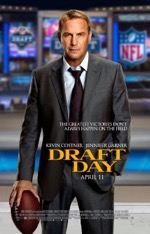
Starring: Kevin Costner
April 2014
This review was originally tweeted in Real-time from the back row of a movie theater and appears @BackRoweReviews. Though efforts were made to tease rather than ruin this movie’s memorable lines and moments, some spoilers may exist in the following evaluation. The original tweets appear in black, while follow-up comments appear in red. For concerns over objectionable content, please first refer to one of the many parental movie guide websites. All ratings are based on a four star system. Happy reading!

32 teams, 7 rounds. “The clock is always ticking.”
Chris Berman’s opening narration certainly generates excitement over what’s to come later in the film. His presence also legitimizes the movie and lends the fictional story some semblance of a “real” NFL draft.
The Browns are a desperate team? Not exactly a news flash.
However, I do applaud writers Rothman and Joseph for their decision to cast the spotlight on one of the most downtrodden franchises in professional sports (and for making the Seahawks organization look like a bunch of money-grubbing schmucks…no love lost here). Somewhere in the movie, someone mentions changing the look of the Browns’ helmets. I hope I wasn’t the only one who agreed with such a sentiment. Is there a plainer, uglier helmet in the NFL?
A deal over pancakes. Costner isn’t hungry.
“People pay to get splashed.” A powerful commentary on the state of the game.
Frank Langella is such a great actor who brings gravitas to every role he plays. He makes Costner seem like a whimpering child in this scene.
Lots of split screens. A bit much?
The film employs more split screen scenes than an episode of 24. It’s a useful device for showing two sides of a phone conversation—and there are a lot of them in the film—but by the middle of the movie this stylistic choice reaches overkill status. I will say that Reitman cleverly shows one person’s shoulder jutting into the image of the other person’s image panel, etc, and the scene where an individual travels from one edge of the screen to the other, passing right over the other person talking on the phone, was absolutely brilliant.
Costner trades the future of the franchise for some “magic beans.”
This critique comes from his screen mom, Ellen Burstyn.
Montana spots John Candy in the stands at the 1989 Super Bowl. Wonderful anecdote and scene.
I’d never heard this story before and it really enriches the text and subtext of this scene.
Is that your final answer, Callahan?
Sorry Bo, the Browns already have a “super” quarterback.
If the emphasized word is too cryptic…Tom Welling from TVs Smallville.
Final analysis: an educational, if fictional, behind-the-scenes look at the NFL draft.
Not as lightweight as some of Reitman’s earlier efforts, but not as engrossing as it should’ve been either.
Rating: 2 1/2 out of 4 stars. An original gridiron tale that should tide over diehard fans until the new season.
If Costner keeps on this career track, he’ll soon be the king of sports movies. How many has he made anyway? Bottom line, this is a decent film that effectively reveals the back room wheeling and dealing that accompanies an NFL draft. As exciting as that sounds the film is often devoid of excitement, owing largely to the fact that the character moments feel perfunctory and insipid. The blossoming relationship between Costner and Garner, the pressure Langella places on Costner and the family friction that results from the recent death of Costner’s dad all play out like vignettes in a Lifetime movie. Although it captures the flavor of an NFL draft, the movie is a pale reflection of the exhilarating, pulse-pounding drama that takes place during an actual draft. As such, some will choose to forego this film and just wait another month for the real thing.
Trouble with the Curve (PG-13)
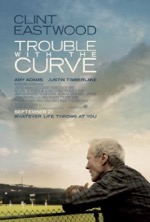
Starring: Clint Eastwood
September 2012
There were rumors that Gran Torino (2008) would be Clint Eastwood’s swan song as an actor, but fortunately the lovable curmudgeon is back in the saddle in Trouble With the Curve, a middling baseball yarn directed by Robert Lorenz. Here, Eastwood plays a crusty baseball scout who’s too proud to get an eye surgery or use a computer for stat analysis, despite his daughter’s (Amy Adams) incessant urging to get ocular support for the former and his boss’ (John Goodman) eternal consternation over the inefficiency of the latter. Adams is an up-and-coming lawyer who can spit out baseball stats like Vin Scully…a chip off the old block, though her career choice is a disappointment to Eastwood, who had trained Adams from her youth to eventually fill his shoes. Justin Timberlake, who’s a rival to Eastwood and love interest for Adams, introduces a change up element into the middle of the plate narrative. Or to put it another way, the story would’ve been pretty vanilla without Timberlake’s twist of wild cherry.
One of the major plot points involves a young slugger who has a ton of talent and confidence, but also plenty of attitude and arrogance to match. Goodman, along with front office staffers Robert Patrick and Mathew Lillard, must decide whether or not to draft the young phenom over Eastwood’s objections concerning the player’s dubious potential. But with failing eyesight and archaic scouting methods are Eastwood’s evaluative skills to be trusted with a big paycheck on the line?
Trouble sets up well with Eastwood’s physical impediments, Adams’ struggle to make partner at a law firm while helping out stubborn dad, Timberlake’s hero worship of Eastwood and schmoozing of Adams and Goodman’s constantly challenged loyalty to Eastwood by Patrick and Lillard. There are some good character moments throughout, like Eastwood’s utter inability to have a conversation with Adams about anything other than baseball. An insider’s look at the baseball scouting process and interactions between scouts and the front office is mildly diverting, and the character beats are marginally intriguing, but the film, much like the young man being scouted, fails to deliver on its potential.
The trouble with the film is its ending: contrived to the point of absurdity, the populist notion that a kid who’s never played on a baseball team can strike out a slugger at the top of the draft class is reassuring and heartwarming, but utterly ludicrous. Adams’ decision to leave behind a promising career in law to follow in daddy’s footsteps is also oversimplified and overly idealistic. It’s just another populist climax for viewers who get off on that type of roses and rainbows ending. Also, and not that a film must always tie up all of its loose ends, but we never learn if Eastwood undergoes eye surgery or if he decides to stay with the game or retire.
With the film’s pedigree I expected a lot more from it; maybe not Field of Dreams (1989) but perhaps something comparable to The Rookie (2002). Unfortunately, this film isn’t as magical as the former or as inspirational as the latter. Trouble has a few solid innings, but strikes out in the end.
Rating: 2 1/2
Moneyball (PG-13)
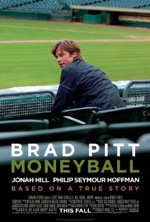
Starring: Brad Pitt
September 2011
So here we have one of the timeliest movies regarding the current state of our society and economy. Oh, and it just happens to be about baseball. Moneyball chronicles the actual events surrounding a general manager’s brazen decision to eschew the tried-and-true recruiting strategies employed by MLB franchises for over a hundred years in favor of a statistical algorithm developed by an economics graduate from Yale.
Oakland A’s general manager, Billy Beane (Brad Pitt), indicts his team’s old guard for upholding errant philosophies of recruiting talent—i.e. don’t trade for a player if his girlfriend is ugly because that means he has no confidence. In 2001, the A’s put 39 million dollars worth of talent on the field while the New York Yankees fielded a team worth 114 million. Knowing that his David will never be able to slay the Goliath’s of the league, Beane tells the room of stodgy scouts, “It’s an unfair game…we’ve got to think differently.”
Enter Peter Brand (Jonah Hill) and his paradigm shattering notion of buying wins not players. Beane sticks his neck out for Brand and his revolutionary concept, but club manager, Art Howe (Philip Seymour Hoffman) is resistant to the radical adjustments made to his line up. In the early goings, it appears that Beane will get the axe, but by season’s end something magical happens in the other City by the Bay as statistical probabilities turn into logic-defying reality.
There’s little suspense here for MLB fans who know the results of Beane and Brand’s experiment, but the storytelling is compelling and the performances—across the board—are superb. Also, those normally turned off by “sports” movies just might enjoy Moneyball because it’s more about characters and convictions than memorializing some legendary game from the past. However, Moneyball isn’t completely devoid of competition as it effectively weaves actual game footage along with reenactments by actors into a seamless tapestry that supports the story rather than dominates it. All of this to say, Moneyball is an engaging “true story” drama that just happens to be about sports.
So what does all of this have to do with the current state of our country? Well, maybe it’s just me, but doesn’t it seem like we can use some of Beane’s and Brand’s open-minded strategizing on Capitol Hill about now? Clearly the old ways, promulgated by old guard politicians (many of whom are, well…old), just don’t work anymore. I’m not suggesting that we throw the baby out with the bathwater, but there can be no doubt that some new ways of thinking are needed in order to get our economy back on track.
Moneyball exposes, in microcosmic form, the kind of myopic and rigid reasoning that’s lead to stagnation and entropy (not to mention apathy) in that colossal franchise called the USA. So I guess it’s true what they say about baseball imitating life. Heck, for many people, baseball is life!
Rating: 3
The Express (PG)
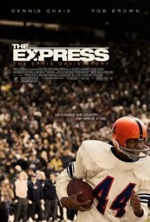
Starring: Rob Brown
October 2008
“Inspiring, if Derivative, True Story Adaptation”
We’ve seen this kind of film many, many times before. As a story centered on an individual athlete, it pales in comparison to Rudy. With respect to its tragic resolution, it resembles Brian’s Song, although it’s not nearly as emotionally overwrought as the James Caan, and Billy Dee Williams’ gridiron classic.
The movie in question is The Express: The Ernie Davis Story. Recruited by legendary Coach Ben Schwartzwalder (Dennis Quaid) to play running back for the Syracuse Orangemen, Davis (Ron Brown) follows in the footsteps of such greats as Jim Brown. We’re afforded glimpses into Davis’ childhood, how pursuing bullies forced him to become a fast runner, as well as an overview of his college years with actual footage of Davis’ real games. His college career culminated with a landmark event in collegiate sports…Davis became the first African American to win the Heisman Trophy.
Brown (Coach Carter) is adequate as Davis but is somewhat laconic, which beautifully fits the part since Davis was the kind of athlete who did his talking on the field. Quaid is much more gruff here than in his past sports movies; his gravelly, smoker’s voice is used with great effect for the no-nonsense coach. Of the supporting cast, two standout performances are turned in by popular character actors Clancy Brown, who plays the assistant coach, and Saul Rubinek, who portrays the owner of the Cleveland Browns, Art Modell.
Though primarily focused on Davis, the story touches upon racism, which was certainly a major social challenge of the period in question. In one scene, rowdy fans toss glass bottles down at the players (even the white ones) because the team had a prominent black athlete as a starter. Even though we’ve seen racism portrayed in other sports flicks, such as Remember the Titans and Glory Road, the movie would’ve been remiss had it not at least touched upon this hot-button, contextualizing, topic.
There’s an inspiring thread of tradition that runs through the film. Coach Schwartzwalder coaxes Jim Brown into recruiting Davis and near the end of the film, Davis, again at the urging of his former coach, helps persuade Floyd Little to play for the Orangemen. The color orange was present during Little’s entire football career: after college, Little went on to play for the Denver Broncos, becoming the nascent franchise’s first star running back. Inspiring, if not amazing, The Express pays fitting tribute to the brilliant career of a class athlete and all-around decent human being who left us far too soon.
Rating: 3
Leatherheads (PG-13)
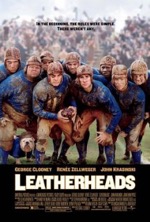
Starring: George Clooney
April 2008
“Screwball Football Farce Reveals Clooney’s Looney Side”
George Clooney’s budding romance with period pieces has blossomed into a love affair in Leatherheads, a comedic look at the early days of professional football, circa 1925. Before rules and regulations “ruined” the game, the players were much more colorful and simply played for love of the game. The money and crowds were as insubstantial as their padding and helmets, but the price was well worth the sacrifice, especially when the alternative was working in the factory, field or mine.
Moving up to the pros was also an outlet for college standouts that refused to hang up their pads after graduation. Such is the case for dashing Princeton running back, Carter “The Bullet” Rutheford (John Krasinski), who’s conscripted by charismatic Dodge Connolly (Clooney) to play for his Duluth Bulldogs. Carter, a war hero of Sergeant York proportions, appears on billboards and stadium advertisements throughout the country. Dodge hopes that such celebrity and visibility will help reinvigorate his failing sport.
On his quest to legitimize pro football, Dodge meets Lexie Littleton (Renee Zellweger), a spitfire news reporter for the Tribune who’s following a lead that will expose Carter’s heroic war story as a hoax. The ensuing love/hate relationship between Dodge and Lexie features some of the finest rapid-fire dialogue to grace a film in recent years. There are numerous scenes where the couple’s spirited bickering takes center stage and almost makes us forget we’re watching a football movie—especially during the passionate argument in Lexie’s cabin, a throwback to Cary Grant and Eva Marie Saint’s tryst on a train in Hitchcock’s classic North By Northwest. Though the movie’s middle chapters are addled by slow pacing, there are several amusing subplots that help keep the film on track: a love triangle forms between Dodge, Lexie and Carter, Dodge and Lexie evade a Keystone Cop-like police pursuit and Dodge and Carter engage in a gentleman’s fistfight where each man itemizes injured areas for the other to avoid.
The climactic game pits dotting Dodge against former teammate Carter on a muddy field in Chicago. The new commissioner’s edict that the contest be played without Dodge’s usual on-field antics forces the aging player to use all of his ingenuity in drawing up a game-winning play. Taking a cue from Carter’s grossly exaggerated war record, Dodge dubs the play the “Sergeant York.” The unconventional, yet not entirely illegal, play caps a slobber-knocker contest and a wildly entertaining film.
Leatherheads is classic comedy told on a timeless canvas, bolstered by directorial panache and acting acumen. Above all, it’s good old-fashioned filmmaking that pays fitting tribute to Hollywood’s Golden Age.
Rating: 3
Lucky You (PG-13)
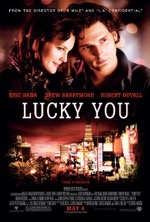
Starring: Eric Bana
May 2007
“Bana and Barrymore Are a Winning Pair”
Movies that try to create an epoxy out of disparate story elements (like Treasure Planet’s pirates in space conceit) typically fail to bond either because the elements aren’t complimentary or because spectators would enjoy seeing a film about one or the other, but not both together. In Lucky You, director Curtis Hanson—along with a star-studded cast including Eric Bana, Drew Barrymore, Robert Duvall and Debra Messing—has defied the odds with his surprisingly robust romantic drama that revolves around poker.
Huck Cheaver (Bana) is a fast-living, thrill-seeking poker addict, who lives life on the edge and lets the chips fall where they may. Estranged from his father, L.C. (Duvall), Huck has refined the art of smooth-talking, especially with women, but his lack of commitment coupled with his gambling habit has relegated him to a life of loneliness in his Spartan house, which boasts a high-end entertainment system but has less furniture than a motel room.
The movie’s romantic leads first meet when Huck rescues Billie (Barrymore) from a sleazy schmoozer. Huck soon learns that Billie is the younger sister of one of his acquaintances, Suzanne (Messing). Despite Suzanne’s warnings, Billie becomes involved with Huck, but it doesn’t take her long to discover Huck’s score: Hustle = 10, Commitment = 0. As someone who doesn’t fall for his patented spiel, Billie challenges Huck with, “You say whatever you want people to hear.” As Huck’s feelings for Billie intensify, he finds himself at a crossroads; his budding relationship now stands in direct opposition to his dream of competing in the World Series of Poker.
For some, Lucky You will feel like a feature-length version of a TV poker tournament; others will see the film as an extended seminar on the finer points of Texas Hold ‘Em poker. However, there’s more here than just a high-stakes card game. The movie is extremely instructional at revealing the gambler’s mentality: the competition and compulsion that compels the gambler to risk it all on a bet (one of Huck’s male acquaintances looses a wager and is made to walk around with false breasts).
Bana and Duvall are a very good father and son pairing and have excellent chemistry—L.C. is a two-time W.S.P. champion and Huck has lived his life in the shadow of his father’s accomplishments—the friction between the two is nearly palpable. There’s an excellent scene where L.C. shows up at the café where Huck and Billie are having breakfast. Billie, feeling awkward about the unexpected intrusion, excuses herself to make a phone call. Father and son engage in a war of words as they play a fast-paced variation of poker. Besides the action onscreen, what makes the scene crackle with intensity is the knowledge that Billie will soon return and find them playing poker. When Billie does return, her reaction—which ranges somewhere between shock and revulsion—reveals the perspective of an outsider who, for the first time, sees the mental illness that inflicts those with a gambling habit.
Duvall, like fine wine, continues improving with age—his performance here is easily the most textured and intricate in the film. Bana and Barrymore are a feasible couple and both shine in their respective roles. Though Barrymore is the beneficiary of some fine dialogue, written by Eric Roth and Hanson, she still holds her own in a role more demanding than her usual teeny-bopper fare. Parts like this just might make a serious actress out of her…time will tell.
The biggest challenge the movie faces is timing, which on the face of it sounds ignorant since timing is crucial to every movie. Texas Hold Em’ reached the height of its popularity, at least on TV, about two years ago. Had the movie been released at that time—or even six months ago so that it could cash in on some of Casino Royale’s success—Lucky You may have stood a better chance of winning big. As things are, Lucky You is a solid hand that plays up to its potential, but unfortunately doesn’t get the best of it.
Rating: 3
We Are Marshall (PG)
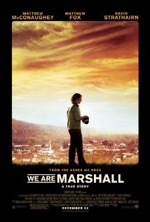
Starring: Matthew McConaughey
December 2006
“We Are…Mildly Inspired”
Widely regarded as the worst tragedy in the history of collegiate sports, the Marshall University football squad, after suffering a 17-14 loss to East Carolina on November 14, 1970, boarded a plane that crashed in mid-flight. There were no survivors. The new movie based on that horrific true account, We Are Marshall, focuses on the process and politics involved in rebuilding the school’s football program.
The unenviable task of finding a replacement football coach falls on Marshall’s president, Dr. Don Dedmon (David Strathairn). As fate would have it, the last person on Dedmon’s list, Coach Jack Lengyel (Matthew McConaughey), accepts the position; Jack’s passion for life and football stands in stark contrast to the grief-stricken community of Huntington, WV. There’s a great scene where Jack approaches Red Dawson (Matthew Fox) to be his assistant; Jack learns that fate guided Red’s decision to drive home the night of the crash. Sympathetic but firm, Jack challenges Red to stop wallowing in his pool of self-recrimination and get on with living…Red accepts the job.
Ian McShane (Deadwood) plays the chairman of the school board, Paul Griffen. Paul, an embittered shell of a man whose son was one of the 75 casualties, opposes the groundswell movement to reinstate the football program and threatens to fire Dedmon if the president doesn’t change his position. If Paul has a soft spot it’s for Annie (Kate Mara), the fiancée of Paul’s deceased son. The scene where Annie returns her engagement ring to Paul is one of the movie’s most moving moments.
As would be expected, the film has its fair share of football sequences, which serve as brief respites from the unrelenting, heavy-hitting drama. Thankfully, the film doesn’t get bogged down in the kind of play by play minutiae we’ve seen in some other football movies—the story here focuses on the team and community, not on some glorious championship game. In fact, the movie ends, unconventionally, right after the second game of the ’71 season. Even though writers Jamie Linden and Cory Helms do a good job of balancing game elements with character interplay, the story is still just as predictable as the Power I formation. Further, the movie’s resolution has too much hang time and is overly sentimental, especially for a testosterone-infused gridiron film.
Other fumbles were committed by the technical teams: poor sound mixing, disjointed editing and shoddy direction by McG. On the flip side, the cast does an excellent job in roles that very easily could’ve become stilted. McConaughey steals the show with his portrayal of enthusiastic, dynamic and charismatic Coach Lengyel—nothing seems to get him down and his eternal optimism (like when he asks rival coach, Bobby Bowden, for pointers on how to run the veer) is downright inspiring.
As long as you’re willing to lower your expectations a bit (this isn’t Rudy or Remember the Titans), We Are Marshall will fill the bill if you need an inspirational sports flick fix. We Are Marshall serves its purpose with solid performances and a faithful script, but would loose by a late touchdown to other top-ranked football movies.
Rating: 2 1/2
Invincible (PG)
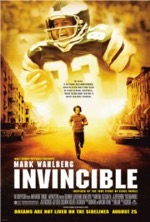
Starring: Mark Wahlberg
August 2006
“Wahlberg Flies Like an Eagle in Inspirational Gridiron Tale”
“Never tell me the odds!” That’s what Harrison Ford’s Han Solo told statistic-spewing robot, C-3PO, in The Empire Strikes Back. I wonder what the odds would be against a thirty-year old Average Joe earning a walk-on spot with an NFL team having only played one year of high school football. Whatever the odds, Vince Papale, a struggling Philly bartender, beat them in 1976 when he achieved the impossible and became a Philadelphia Eagle.
In the movie, Papale is played by Mark Wahlberg, who resembles the physical proportions—if not facial features—of the genuine article. Wahlberg’s performance is efficient, but certainly isn’t flashy; this also seems to mirror the real Papale, who originally was reticent to try out for the team and shied away from media attention…many reporters were all too eager to cover his miracle story.
As the movie opens, Papale is at his lowest point; his wife just walked out on him and his employment as a substitute teacher was recently terminated. New Eagles coach, Dick Vermeil (played with gridiron precision by Greg Kinnear…a touchdown for the casting department), makes an announcement that the Eagles will hold open tryouts at Veteran’s Stadium that Saturday. Vermeil’s pronouncement may have been viewed as a media stunt, but his real strategy was to shake up the entire Eagles organization—which had grown accustomed to loosing—and wake up a city that had fallen into a mental rut concerning their hometown team.
Though Papale’s friends encourage him to try out for the team, his father has a different opinion, “Let this one go; a man can only take so much failure.” Ignoring his father’s advice, Papale finds the nerve to try out, and of the thousands of Eagle wannabes that converge upon the stadium, Papale is the only person asked back to Eagle’s training camp. Spurred on by his dream to play professional football and by his ex-wife’s acerbic departure note (which basically says he’ll never amount to anything), Papale gives it his all during a tumultuous training camp and preseason, and anyone who’s familiar with the story, or who’s seen the trailer, can connect the dots from here. There’s no major twist here; history has already taken away any possibility of a surprise ending.
In the grand tradition of feel-good sports films like Rudy and The Rookie (whose producers also worked on this film), Invincible carries the “follow-your-dreams” torch with pride and excellence. Though the film’s through line is as straight as a Bradshaw spiral, there are several character-defining subplots that flesh out the movie and broaden our knowledge of the protagonist; such as the Cheers-like moments in the bar, the back lot football games and the arrival of Papale’s new love interest, Janet (Elizabeth Banks), who happens to be a die-hard fan of the rival NY Giants.
From the sets and costumes to the shaggy coifs, every aspect of the movie appropriately fits the period in which it was filmed; the 70’s soundtrack also adds an extra degree of authenticity. And speaking of authenticity, the inclusion of actual game footage, featuring some of Papale’s highlight plays, is a really nice touch.
Invincible is pure, unadulterated inspiration; a poignant reminder to us all that no matter who you are or where you’re from, as long as you have a dream and are willing to contend for it, miracles can happen. This is one of the best films of the year!
Rating: 3
Cars (G)
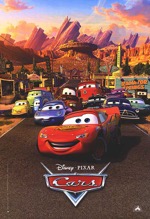
Starring: Owen Wilson
June 2006
“High-Octane Joyride Leaves Other Animated Films in the Dust”
I have to admit it…I’m one of those rare guys who just isn’t into cars. I know how to change an air filter, but that’s the extent of my automotive prowess. My windshield wipers need to be replaced, but I keep procrastinating; putting it off for a rainy day. The NASCAR gene skipped me and went to my older brother, Mike. Growing up, I remember particular Sundays when Mike would sit on the couch all afternoon and watch an entire three hour motor-fest (more times than not, he’d drift off to sleep midway through the race). It fascinated me to no end that a person could be perpetually entertained by different colored cars going in circles for hours on end; then again, I’ve been known to spend the same amount of time watching twenty-two players fighting over an elliptical leather ball.
The newest animated foray by Pixar is simply titled Cars. Celebrating twenty years of excellence in animated entertainment, Pixar knows how to appeal to a mass audience. Their last outing, The Incredibles, was right up my alley, but many people aren’t into the whole superhero thing. Even so, they still turned out in droves to see the only Pixar presentation to date that features humans. I firmly believe that Pixar can take any topic or genre and find a way to make it appealing to a demographic wider than Elastigirl’s reach. And with Cars, you don’t have to know the difference between a lug nut and a corn nut to appreciate the amazing animation, colorful characters and exhilarating story.
The movie begins with a high-octane race known as the Piston Cup, which results in an unprecedented three-way tie between retiring veteran, The King (voiced by race legend, Richard Petty), aggressive upstart Chick Hicks (Michael Keaton, fresh off his turn in car-centric Herbie: Full Throttle) and hot-shot rookie, Lightning McQueen (Owen Wilson). In one week, the three cars will go head-to-head in a tie-breaker in L.A. to determine, once and for all, the Piston Cup champion.
McQueen, a self-professed “one man show,” fires his pit chief and refuses to give up a lead in order to change tires. A bona fide prima Donna, McQueen hogs the camera every chance he gets, but is chagrined each time he does an advertisement for his small-fry sponsor, Rust-eze. McQueen’s dream is to be endorsed by mega-sponsor, Dinoco, but his repeated attempts to woo the company are to no avail.
On the way to the big race, McQueen falls asleep at the wheel and wakes up in the middle of the desert. The cherry-red race car soon drifts into Radiator Springs, the quintessential town that time forgot. An eccentric burg stuck in neutral by small-town mentality, Radiator Springs is chock-full of dented fenders, rusted frames and faded neon signs. As McQueen desperately attempts to escape “hillbilly hell” and get to California in time for the big race, he gradually begins to understand the townsfolk and their struggle to matter in a world that’s passed them by.
Though it takes a while to rev up its narrative engine (the first half of the movie doesn’t have near the same horsepower as Pixar’s previous outings), the film is a rollicking good time once it gets up to speed. The movie is brimming with memorable characters like Doc Hudson (a.k.a. The Hudson Hornet, three time Piston Cup winner), voiced by screen giant Paul Newman, McQueen’s romantic interest, Sally, voiced by Bonnie Hunt, and the dumb-as-a-post rust-bucket named Tow Mater, brought to life by Larry the Cable Guy. Mater, who claims to be the world’s best backward driver, steals the show with his dim-witted antics. The scene where Mater shows McQueen the finer points of Tractor Tipping (“Tractors is so dumb,” he informs McQueen), is one of the most memorable moments in the movie. Mater’s life-long wish is to take a helicopter ride, and when his dream comes true at movie’s end, his line, “I’m happier than a tornado in a trailer park,” is the funniest I’ve heard this year.
Beyond all the flashy cars, inside gags, creative flourishes and eye-popping CGI, there are several wonderfully tender and powerfully poignant messages in the movie, one of which finds expression in James Taylor’s wistful song “Our Town.” Themes such as learning to rely on others, the fear of becoming obsolete and the need to slow down and enjoy life are all subtly woven into a tale that would have broken down after a few laps had it solely focused on spark plugs and fan belts. No Mater what, Pixar is still the undisputed king of genuine human storytelling with anthropomorphized characters.
Rating: 3
The World’s Fastest Indian (PG-13)
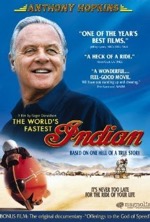
Starring: Anthony Hopkins
February 2006
“High-octane Biopic is Built for Speed”
The true story of intrepid Kiwi motorcycle racer, Burt Munro, is an inspiring journey of courage, determination and unyielding passion in the face of persistent adversity. Pushing his heavily modified, highly-experimental 1920 Indian Scout bike to insane velocities, Burt was built for speed. He tells Thomas, the neighbor boy, “You live more in five minutes on a bike going flat out than most people do in their lifetimes.”
Known about town as an eccentric hermit, Burt uses a power sander to file his toenails and an acetylene torch to heat a kettle of water for tea. He also pees on his lemon tree to help it grow. When Thomas’ father implores Burt to mow his lawn because it’s a disgrace to the community, Burt douses the ankle high grass with gasoline and sets it on fire. Some might mistake Burt’s quirky insouciance and hermit-like lifestyle for xenophobia, but nothing could be further from the truth. Burt’s the type of person who can make friends with anyone, anywhere, at any time. Individuals in pursuit of a dream generally attract a following, and so it is with Burt, who’s aided by a vast array of individuals as he makes his way from Invercargill, New Zealand to the Bonneville Salt Flats in Utah.
The culture shock Burt experiences when he reaches the US is poignant in an amusing way. Rude cabbies and soliciting prostitutes soon pale in comparison to the hotel clerk he encounters in Hollywood, a cross-dresser named Tina. Burt purchases a car from Fernando, who nearly has a coronary on the test drive when Burt drives on the wrong side of the road. When Burt’s jury-rigged bike hitch looses a wheel, a Native American named Jake helps with repairs and also gives Burt something to help with his failing prostate (a powder made from ground up dog testicles). Despite considerable and frequent setbacks Burt never once looses his sense of humor—his strength of will and persistence of vision fuel his drive to fulfill a lifelong dream.
Although it’s been said a dozen times before, this is one of Anthony Hopkins’ finest performances. Hopkins wholly inhabits Burt and endues the dotting daredevil with a dignity and morality that’s quite refreshing. Tour de force doesn’t even come close to describing Hopkins’ masterful turn; not only does he anchor the film, as the only marquee name in the cast, he is the film.
The World’s Fastest Indian is a gem of an indie flick that comes with a heartening reminder that it’s never too late to pursue a dream. The reason why Hollywood has been so heavily criticized for the frequently lacking body of work it produces? It doesn’t make enough movies like The World’s Fastest Indian. The film is a rare cinematic treasure that you’d do well to rush out and see.
Rating: 3 1/2
Glory Road (PG)
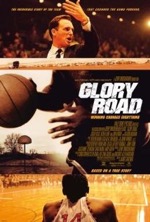
Starring: Josh Lucas
January 2006
“Inspirational Basketball Formula Still Works”
Last year’s model was Coach Carter, a “based on a true story” project spotlighting basketball coach Ken Carter’s extreme measures to build men of character out of his troubled inner-city players; a story that made national headlines in 1999. This year’s model, presented by Buena Vista studios and director James Gartner, chronicles Don Haskins’ (one time woman’s basketball coach and later Hall of Fame basketball legend, played here by an even-keeled Josh Lucas) visceral and controversial decision to start all black players in a championship game—something that, to that point, had never been done before. You don’t need a magnifying glass to see the movie’s social commentary with regard to racism, and its similarity to other sports films, Remember the Titans in particular, is an inherent weakness in the plot. However, it’s the strength of the story alone that salvages this familiar recipe (i.e. an underdog team that wins the championship) and bails out Lucas’ uninspired performance.
What bothered me more than Lucas’ flaccid acting, however, was Haskins’ lackadaisical leadership style (my interpretation of Haskins is strictly based on how the movie portrays him). Haskins, apparently, had none of the fire that Gene Hackman’s Coach Norman Dale had in Hoosiers (the quintessential film on the subject); far too often in the movie Lucas capitulates to his players, and though he preaches the fundamentals of the game (solid defense and no showboating), his overall lack of leadership presence was a constant irritant to me. The line, “They’re not going to give you anything…you’ve got to go out there and take it,” made memorable by the trailer, is one of the only instances in the movie where Lucas shows emotion of any kind. In fact, the only coaching acumen I detected in the movie was when Lucas taunts his players with various negative headlines written about his team as a means of getting them fired up for the big game.
Emily Deschanel (TV’s Bones), who plays Haskins’ wife, is nothing more than set dressing in the movie and Derek Luke (Antwone Fisher), who plays Haskins’ star performer, does a solid job with a two-dimensional character. The only standout performance in the movie is Jon Voight’s portrayal of revered and feared University of Kentucky coach, Adolph Rupp. Only eagle-eyed viewers will recognize Voight at first glance due to a nose appliance; the veteran actor, once again, proves that he can play anything.
Glory Road, the true story of how downtrodden Texas Western University won the NCAA championship game in the mid-sixties, is uplifting if not particularly original. The main problem here: after the goose bumps fade so will any memory of the film.
Rating: 2 1/2
Dreamer: Inspired By a True Story (PG)
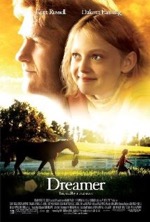
Starring: Kurt Russell
October 2005
“Emotional and Inspirational Horse Tale”
If watching a movie could be like slipping on a pair of worn-in boots, Dreamer would definitely be that movie. You already know the ending when you see the trailer (movie, not horse), but there’s still something reassuring, comforting and inspiring about a story where someone dreams big and wins, especially if it’s based on a true story. Especially if it features Hollywood’s youngest starlet, Dakota Fanning (who, according to a recent EW article, has outperformed every other adult female actor—including Julia Roberts—at the box-office this year).
Ben Crane (Kurt Russell) is a weather-worn horse trainer who struggles to connect with his distant daughter, Cale (Fanning), beleaguered wife, Lilly (Elizabeth Shue) and estranged father (Kris Kristofferson), while contending with his racist boss (David Morse), who fires Ben and gives him a Philly with a broken leg as severance pay. Ben nurses Sonador (Spanish for Dreamer) back to health—with the additional aid of Cale, who sneaks out of the house late at night and feeds the horse popsicles—and the horse is soon racing along the countryside. Ben sees the horse’s breeding potential, but Cale steadfastly holds to the silly notion that Sonador will race again and begs dad to let her keep the horse.
Cale is given ownership of the horse and after winning a few small-time races, she sets her sights on the Breeder’s Cup. Everyone thinks Cale is overly idealistic, but when Sonador clinches the final spot on the Breeder’s Cup roster, the family is faced with the next colossal challenge—coming up with the formidable entry fee. Beyond that seemingly insurmountable obstacle is the unsettling knowledge that Sonador has never been in a race this big and is predicted to finish last (lingering concerns as to stability of Sonador’s leg also throws a pal over the horse’s chances of finishing favorably). In this seething cauldron of doubt and dream-shattering circumstances, Cale’s courage primes the pump of the impossible; not just reconciliation between Ben and his family, but also a goose-bump raising finale that rivals Seabiscuit’s harrowing climactic race.
The lines on Russell’s face are showing through the make-up more these days, but like fine wine, his performances are improving with age (Miracle). There’s a bit of dream casting in the movie; Russell and Kristofferson look like real-life father and son, and the interplay between these big-screen veterans is a real treat. Superlatives always seem to fail when describing cherubic Fanning, and frantically flipping through a thesaurus to find that choice adjective seldom works either. Suffice it to say, Fanning has turned in another precocious performance here and is rapidly becoming the queen of the silver screen…at age ten.
From the opening sequence to Bethany Dillon’s uplifting, tear-jerking song accompanying the end credits, Dreamer is one hundred percent inspiration—a family-friendly, fun-filled tale that reminds us to pay heed to the dreamer inside.
Rating: 3
Kicking & Screaming (PG)
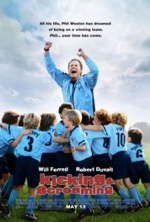
Starring: Will Farrell
May 2005
“It’s What You’ll Be Doing To Get Out of the Theater”
Call it the Bad News Bears of soccer, Kicking and Screaming is unsatisfactory as a sports movie and unsavory as a family movie. Just a few months ago, I saw a Woody Allen film entitled, Melinda and Melinda, which starred, among others, Will Ferrell. Ferrell was mesmerizing as a man estranged from his wife and falling in love with another woman. He showed promise as a dramatic actor and demonstrated a range previously unseen, and frankly, unimagined. Unfortunately, with Kicking and Screaming, Ferrell is back to his normal, comedic shtick and only displays an occasional flicker of his former brilliance.
Phil Weston (Ferrell) has spent his entire life in the shadow of his choleric, tough guy father, Buck (Robert Duvall), and has never lived up to Buck’s standard as a husband, father, businessman or human being. Phil was all elbows and knees when playing sports as a kid and held a permanent spot on his father’s bench. Now, when Phil learns that Buck traded his son, Sam, to a lower ranked team to give the boy more playing time, he spitefully accepts the vacant coaching position on Sam’s new team. Phil is out of his league as a coach, especially when taking on Buck, so he enlists the help of his father’s chief rival and next-door neighbor to be his assistant coach—Mike Ditka.
Ditka introduces Phil to coffee (the fuel of champions) and Phil is soon addicted, downing cup after cup at coffee shops and setting up an espresso machine on the bench during games. The team starts winning, thanks to Ditka’s expert guidance and the assistance of two Italian soccer prodigies—the boys can only play when all of their father’s meat orders are delivered (meat comes first). Phil’s newfound lust for winning, coupled with his strict coffee diet, sends him over the edge; he benches his son and the rest of the players are uneasy around the person he’s become. After his wife brings him back to reality, Phil destroys the coffee machine, apologizes to the team and reverts to his former, friendlier self. Throwing out the playbook and admonishing his kids to just have fun, Phil beats his father in the championship game and breaks the curse of his childhood.
If there’s a moral here, it’s murky, and Phil’s coaching tactics while under the influence of coffee (i.e. breaking opponent’s ribs) are reprehensible—the scene isn’t even remotely funny and certainly doesn’t belong in a family film. The movie tries to be a comedy, but isn’t—the coffee subplot is utterly ridiculous and Phil’s awkwardness around the lesbian couple might have been amusing ten years ago, but bombs here. The movie tries to be this year’s feel-good sports movie, but fails miserably. Kicking and Screaming tries to be entertaining, but sails far wide of its goal.
Rating: 2
Million Dollar Baby (PG-13)
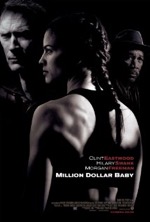
Starring: Hilary Swank
January 2005
“Exceptional Cinema with Powerful, Emotional Punch”
Million Dollar Baby is triumphant in its delivery, masterful in its subtlety, exceptional in its artistry and potent in its poignancy. At the sake of sounding cliché, Million Dollar Baby lands all of its punches, and just like in a real-life fight, it’s the ones you don’t see coming that impact you the most. I have to admit, I didn’t see the movie’s major twist coming, nor did I expect the gut-wrenching ramifications of that event to affect me so deeply. The buzz on the street is that Million Dollar Baby has a controversial climax, and while that may be very true, it’s impossible to walk away from the theater without being emotionally impacted, one way or the other. Like a ghost image of the soul, the movie’s haunting dénouement leaves you with brutally introspective questions such as, “what would I have done in the same situation?”
Clint Eastwood, clearly a grand master of his craft, is pitch perfect as both actor and director—there’s no doubt that he’s still in his prime or that he’ll be contending for several Oscars this spring. Eastwood’s curmudgeonly boxing trainer, Frankie Dunn, is a marvelous character; Frankie’s rough exterior is like a suit of armor, but the chink is his tender spot for Maggie Fitzgerald (Hilary Swank), a struggling young waitress who insists on calling him “boss” and hangs around the run-down gym until Frankie gives in and finally agrees to manage her. Frankie’s assistant is former boxing legend, Eddie “Scrap-Iron” Dupris (Morgan Freeman at the top of his form), the man who looks after the gym with his one good eye and helps out hard luck cases, like Maggie, with quiet dignity.
There’s a wonderful scene where Frankie gives Eddie a hard time about his “holey” socks. The scene, by itself, is superfluous, but it’s this attention to creating three-dimensional characters that elevates Million Dollar Baby above the myriads of shallow scripts that have deluged Hollywood in recent years. Since the movie actually takes the time to invest in character development, the payoff is much greater than if they had settled for the standard, cursory attempt to give the audience a passing familiarity with the characters or to simply gloss over the whole works with snazzy special effects.
Million Dollar Baby is the story of a determined young woman with an unwavering desire to fulfill a dream, and the grim reality that life can drastically and tragically change in an instant. It’s the touching tale of a young woman who never really had a father and a man who comes to love that woman as his own daughter. There’s a million reasons why the movie is a brilliant example of high art, and at least a billion reasons why Million Dollar Baby should be the screen champion this year.
Rating: 3 1/2
Coach Carter (PG-13)
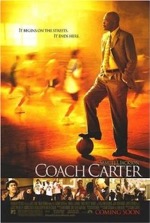
Starring: Samuel L. Jackson
January 2005
“Inspiring, but Derivative Hoop Tale”
Call it “Hoosiers in the Hood,” Coach Carter is based on the true story of an extraordinary Southern California basketball coach who inspired his players to greatness on the court and in the classroom. Ken Carter’s (Samuel L. Jackson) hard-nosed style of coaching landed him in hot water with parents and the school board at Richmond High: his players had previously signed an agreement that they would maintain a 2.3 GPA, but when they failed to uphold their end of the bargain, Carter locked the gym, effectively forfeiting several games. Due to Carter’s radical measures, the story gained national attention in 1999 and is now presented by director, Thomas Carter, and MTV Films.
The facts are staggering: only 50% of the student body at Richmond graduate, and of those students, only 6% go on to college. Coach Carter is quick to quote these statistics to his players—a bitter reality pill that jolts them into hitting the books. But academic reformation proves a challenge for many of the players, especially those with sordid pasts or turbulent family situations.
Take laconic Kenyon (Rob Brown) for instance; his life takes an unexpected turn when his girlfriend reveals she’s pregnant with his child. With his dreams of playing college ball hanging in the balance, his girlfriend makes a drastic, and life-altering, decision. This subplot is poignant and controversial, but also severely underdeveloped.
The movie’s tragic figure is Timo Cruz (Rick Gonzalez), a talented player whose involvement with drugs and gangs haunts him with every step—even after he determines to clean up his act. A tragic street shooting sends the frightened youth back to Coach Carter and the team, but there is a price for rejoining the squad…1,000 push-ups, which Cruz must complete by Friday night in order to play in the game. In the movie’s most touching scene, Cruz’ teammates pitch in and help the wayward player meet his quota, a teambuilding exercise secretly engineered by Carter.
Though the drills and strategies used by Carter mirror those employed by other coaches from a dozen other sports movies, Carter’s unswerving devotion to developing student athletes is still a refreshingly admirable aspect of the story. His formations, named after his seemingly endless supply of sisters, add levity to the movie’s dark moments, which unflinchingly display the grim reality of life on the streets.
Carter’s rousing speech before the big game is a definite high point, but it’s the movie’s unconventional ending that really stands out as “something different.” The rap/hip-hop soundtrack adds another level of gritty realism to the movie’s urban aesthetic. Coach Carter scores big with memorable performances and an edifying true story: it’s a winner despite missing a few free throws.
Rating: 2 1/2
Wimbledon (PG-13)

Starring: Kirsten Dunst
September 2004
“Surprisingly Fresh Sports/Romance Story”
At first glance, a movie with an identity crisis between a sports flick and a love story is a pretty bad thing. On the one hand, you run the risk of loosing male interest to some sappy romance and on the other hand, females not interested in sports will spend their movie money elsewhere. Wimbledon is a balancing act that, somehow, manages to pull off the difficult feat of becoming a successful sports/romance movie.
There are several contributing factors to this winning formula. First, the leads are attractive, intelligent and have great chemistry together. Paul Bettany (Master and Commander) plays Peter Colt, a thirty-something, nearly washed-up tennis player who’s taking his last shot at winning Wimbledon. Bettany imbues Colt with a brand of charisma that’s believable and endearing—his voice-overs, containing his innermost thoughts, really serve to humanize the character and provide an honest and refreshing portrayal of a struggling sports star.
Dunst (Spider-Man) plays Lizzie Bradbury, a serious newcomer to tennis who has a track record of being distracted by men during big tournaments. She falls fast and hard for Colt (the whole tennis connection), and a torrid romance ensues, much to the disapproval of Lizzie’s overprotective father, Dennis (Sam Neill).
The movie’s climax is predictable, yet uplifting; Colt wins Wimbledon, and, after weathering a series of relational storms, wins Lizzie’s heart. Colt retires, but Lizzie will continue pursuing her dream of becoming a champion at Wimbledon. And, as would be required of such a tale, they live happily ever after.
The star’s contribution to the movie cannot be overstated, but several supporting characters aid and abet Bettany in making Wimbledon a crowd pleaser. The aforementioned Dennis Bradbury (Neill) is solid, as is Peter Colt’s fanatical father, Edward (Bernard Hill of The Return of the King), and the young heartthrob Jake Hammond (Austin Nichols), who serves as fellow tennis competitor and underdeveloped antagonist. Also making cameo appearances are John McEnroe and Chris Evert, who provide some additional celebrity and credibility.
As an independent film, Wimbledon is a small release and will most likely not receive the attention its due. It’s a shame, because Wimbledon is a feel-good flick that reaffirms the notion that it’s never too late to achieve in life.
Rating: 2 1/2
Radio (PG)
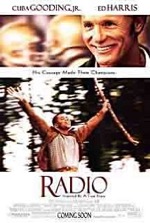
Starring: Cuba Gooding, Jr.
October 2003
“A Triumph of the Human Spirit”
Using the word triumph to describe Radio is no overstatement. Radio delivers on everything it promised in the emotional trailer, plus a great deal more. It’s a genuinely touching story that boasts Oscar-caliber performances by Oscar-winning actors, Cuba Gooding, Jr. and Ed Harris.
The plot isn’t complicated, flashy or filled with mind-blowing twists, but its straightforward simplicity is its greatest attribute. The story is pure and innocent, qualities the title character can readily identify with.
The story takes place in 1976 in a small town in South Carolina, where head football coach, Harold Jones (Harris) spots an odd young man (Gooding, Jr.), who pushes around an old shopping cart that contains various collected items (including a football belonging to Jones’ team). Jones takes interest in the young man and enlists his help on the football team, much to the disapproval of the team, school and community. Jones stands his ground and, over time, becomes a surrogate father for the mentally handicapped youth, whose infectious affection for all styles of music earns him the nickname, “Radio.” What ensues is a journey of self-discovery for both men in this heart-warming tale of human kindness, based on a true story.
Though sports have an important role in the film, this isn’t Remember the Titans or Hoosiers. Whereas sports is the vehicle for telling the story, Radio is all about the flesh and blood characters that breathe life into what otherwise would have been just another modernized re-telling of a glorious championship season of the past.
The pacing of the film is a bit slow at times, but this effect lends itself to the sleepy burg atmosphere of the southern town, and other than this aspect, the directing and writing is very solid. For Radio, James Horner has churned out an original score that is more original than his usual, cookie-cutter drivel (Sneakers, Bicentennial Man and A Beautiful Mind are all virtually the same score), while employing the same ethereal voices in certain motifs.
Radio is a winner because it refuses to lampoon the disability of the mentally challenged lead character, but instead, shows how, in many ways, he is more human than the rest of us “normal” people. Showing clips of the real-life Radio and Coach Jones at the end of the movie was a very nice touch. Radio is an inspiring film that is definitely worth tuning into.
Rating: 3
Seabiscuit (PG-13)
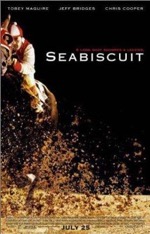
Starring: Tobey Maguire
July 2003
“A Truly Inspirational Triumph”
The only word that readily comes to mind when reflecting upon Seabiscuit is “exquisite.” This is an exquisitely crafted, directed, acted and written film. Based upon the true story and the popular book by Laura Hillenbrand, Seabiscuit tells the story of three individuals and how their lives eventually intersect in wonderful, and sometimes unexpected, ways.
The story picks up in 1910, a time of prosperity for Charles Howard (Jeff Bridges), entrepreneur and car salesman. Life suddenly takes a left turn when his young son drives one of his cars off the cliff and his wife leaves him a short time later. Charles looses nearly everything when the Great Depression hits—no one can afford to buy cars anymore.
But, Charles’ luck changes when he takes a vacation to Mexico; he meets a new woman at the horse races and wins her heart along with a lot of cash. Charles’ life is forever changed when he meets hotheaded jockey, Red Pollard (Tobey Maguire) and an old, eccentric horse trainer, Tom Smith (Chris Cooper), outside the horse track. Converting his car shed into a stable, Charles forges ahead in a new business venture and begins racing Red on a horse named Seabiscuit. They win some small-time races, but Charles has his sights set on bigger prey; he baits the owner of War Admiral, one of the fastest horses in the country, into racing against Seabiscuit—the contest is akin to David and Goliath (or the Tortoise and the Hare). So Charles enters the high-stakes race with a horse that’s too short, a jockey that’s too tall and a trainer that’s too old. The race is one for the history books…truly inspiring.
The writing and directing is exceptional in Seabiscuit, but the acting is nothing short of stellar. Jeff Bridges plays salesman Charles Howard to the hilt; the man is so charismatic and charming, he could probably sell a rancher his own cow. The speeches he delivers are so rousing and ennobling that you have to resist the urge to jump up in the theater and yell in agreement.
Chris Cooper (my vote for best supporting actor-2003) is so natural, so likeable and so pitch-perfect in his performance, that it’s impossible to see any other actor in his role. His character is the sage in the movie, delivering didactic delicacies like, “Just because something’s broken doesn’t mean you throw it away.”
If Cooper represents the movie’s wisdom and experience, Tobey McGuire is its heart and soul. Fresh off his Spider-Man high, McGuire’s turn as the tortured jockey is believable and touching. Horse and rider both know a thing or two about pain and that background of brokenness is the common bond between man and animal. It’s this brand of empathy that makes the pair so in tune with each other and so formidable on the track.
The quirkiest, most hilarious character in the movie, undoubtedly, is William H. Macy’s radio announcer, whose flair for mile-a-minute speaking, incisive one-liners and variety show sound effects really lightens the otherwise somber and serious tone of the film. Though his screen time is limited, Macy’s performance is also worthy of Oscar consideration.
Framing the movie historically are snippets of David McCullough’s Seabiscuit documentary for PBS. These historical vignettes, interspersed throughout the movie, serve as segues but also give the film added depth and authenticity. A finely crafted film, Seabiscuit is an emotional journey well worth taking.
Rating: 3 1/2
The Rookie (G)
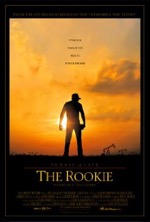
Starring: Dennis Quaid
March 2002
It’s been a long time since I’ve been in an audience that clapped at the end of the movie. It’s been a longer time since I’ve cried while watching a movie. The Rookie is simply the most inspiring movie I’ve seen in a very, very long time.
Rating: 3